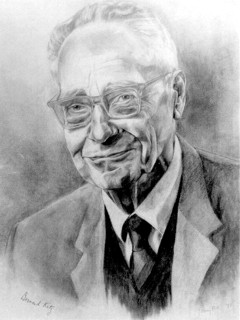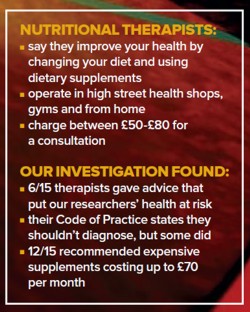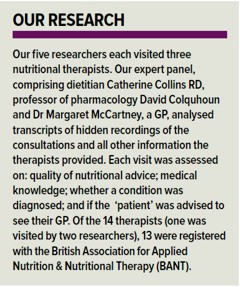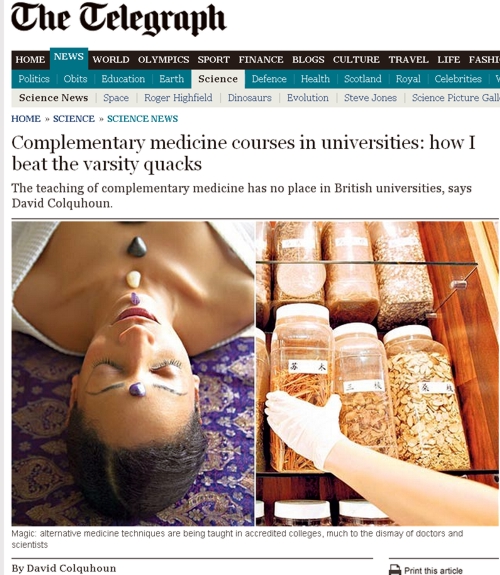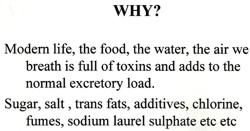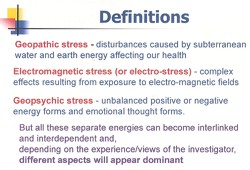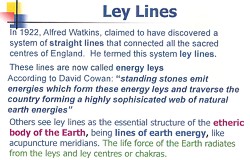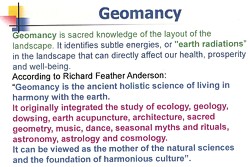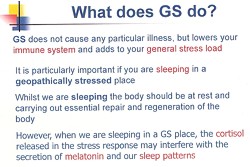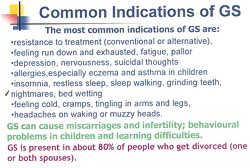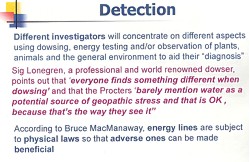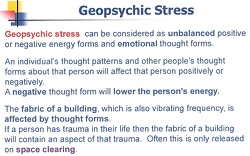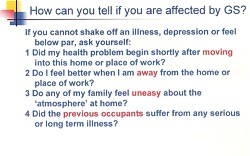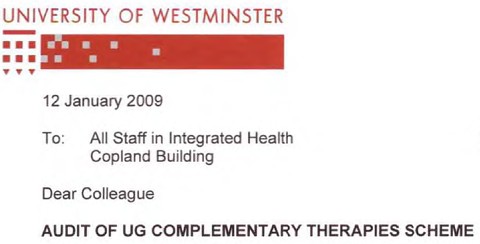nutritional therapy
‘We know little about the effect of diet on health. That’s why so much is written about it’. That is the title of a post in which I advocate the view put by John Ioannidis that remarkably little is known about the health effects if individual nutrients. That ignorance has given rise to a vast industry selling advice that has little evidence to support it.
The 2016 Conference of the so-called "College of Medicine" had the title "Food, the Forgotten Medicine". This post gives some background information about some of the speakers at this event. I’m sorry it appears to be too ad hominem, but the only way to judge the meeting is via the track record of the speakers.


Quite a lot has been written here about the "College of Medicine". It is the direct successor of the Prince of Wales’ late, unlamented, Foundation for Integrated Health. But unlike the latter, its name is disguises its promotion of quackery. Originally it was going to be called the “College of Integrated Health”, but that wasn’t sufficently deceptive so the name was dropped.
For the history of the organisation, see
Don’t be deceived. The new “College of Medicine” is a fraud and delusion
The College of Medicine is in the pocket of Crapita Capita. Is Graeme Catto selling out?
The conference programme (download pdf) is a masterpiece of bait and switch. It is a mixture of very respectable people, and outright quacks. The former are invited to give legitimacy to the latter. The names may not be familiar to those who don’t follow the antics of the magic medicine community, so here is a bit of information about some of them.
The introduction to the meeting was by Michael Dixon and Catherine Zollman, both veterans of the Prince of Wales Foundation, and both devoted enthusiasts for magic medicne. Zollman even believes in the battiest of all forms of magic medicine, homeopathy (download pdf), for which she totally misrepresents the evidence. Zollman works now at the Penny Brohn centre in Bristol. She’s also linked to the "Portland Centre for integrative medicine" which is run by Elizabeth Thompson, another advocate of homeopathy. It came into being after NHS Bristol shut down the Bristol Homeopathic Hospital, on the very good grounds that it doesn’t work.
Now, like most magic medicine it is privatised. The Penny Brohn shop will sell you a wide range of expensive and useless "supplements". For example, Biocare Antioxidant capsules at £37 for 90. Biocare make several unjustified claims for their benefits. Among other unnecessary ingredients, they contain a very small amount of green tea. That’s a favourite of "health food addicts", and it was the subject of a recent paper that contains one of the daftest statistical solecisms I’ve ever encountered
"To protect against type II errors, no corrections were applied for multiple comparisons".
If you don’t understand that, try this paper.
The results are almost certainly false positives, despite the fact that it appeared in Lancet Neurology. It’s yet another example of broken peer review.
It’s been know for decades now that “antioxidant” is no more than a marketing term, There is no evidence of benefit and large doses can be harmful. This obviously doesn’t worry the College of Medicine.
Margaret Rayman was the next speaker. She’s a real nutritionist. Mixing the real with the crackpots is a standard bait and switch tactic.
Eleni Tsiompanou, came next. She runs yet another private "wellness" clinic, which makes all the usual exaggerated claims. She seems to have an obsession with Hippocrates (hint: medicine has moved on since then). Dr Eleni’s Joy Biscuits may or may not taste good, but their health-giving properties are make-believe.
Andrew Weil, from the University of Arizona
gave the keynote address. He’s described as "one of the world’s leading authorities on Nutrition and Health". That description alone is sufficient to show the fantasy land in which the College of Medicine exists. He’s a typical supplement salesman, presumably very rich. There is no excuse for not knowing about him. It was 1988 when Arnold Relman (who was editor of the New England Journal of Medicine) wrote A Trip to Stonesville: Some Notes on Andrew Weil, M.D..
“Like so many of the other gurus of alternative medicine, Weil is not bothered by logical contradictions in his argument, or encumbered by a need to search for objective evidence.”
This blog has mentioned his more recent activities, many times.
Alex Richardson, of Oxford Food and Behaviour Research (a charity, not part of the university) is an enthusiast for omega-3, a favourite of the supplement industry, She has published several papers that show little evidence of effectiveness. That looks entirely honest. On the other hand, their News section contains many links to the notorious supplement industry lobby site, Nutraingredients, one of the least reliable sources of information on the web (I get their newsletter, a constant source of hilarity and raised eyebrows). I find this worrying for someone who claims to be evidence-based. I’m told that her charity is funded largely by the supplement industry (though I can’t find any mention of that on the web site).
Stephen Devries was a new name to me. You can infer what he’s like from the fact that he has been endorsed byt Andrew Weil, and that his address is "Institute for Integrative Cardiology" ("Integrative" is the latest euphemism for quackery). Never trust any talk with a title that contains "The truth about". His was called "The scientific truth about fats and sugars," In a video, he claims that diet has been shown to reduce heart disease by 70%. which gives you a good idea of his ability to assess evidence. But the claim doubtless helps to sell his books.
Prof Tim Spector, of Kings College London, was next. As far as I know he’s a perfectly respectable scientist, albeit one with books to sell, But his talk is now online, and it was a bit like a born-again microbiome enthusiast. He seemed to be too impressed by the PREDIMED study, despite it’s statistical unsoundness, which was pointed out by Ioannidis. Little evidence was presented, though at least he was more sensible than the audience about the uselessness of multivitamin tablets.
Simon Mills talked on “Herbs and spices. Using Mother Nature’s pharmacy to maintain health and cure illness”. He’s a herbalist who has featured here many times. I can recommend especially his video about Hot and Cold herbs as a superb example of fantasy science.
Annie Anderson, is Professor of Public Health Nutrition and
Founder of the Scottish Cancer Prevention Network. She’s a respectable nutritionist and public health person, albeit with their customary disregard of problems of causality.
Patrick Holden is chair of the Sustainable Food Trust. He promotes "organic farming". Much though I dislike the cruelty of factory farms, the "organic" industry is largely a way of making food more expensive with no health benefits.
The Michael Pittilo 2016 Student Essay Prize was awarded after lunch. Pittilo has featured frequently on this blog as a result of his execrable promotion of quackery -see, in particular, A very bad report: gamma minus for the vice-chancellor.
Nutritional advice for patients with cancer. This discussion involved three people.
Professor Robert Thomas, Consultant Oncologist, Addenbrookes and Bedford Hospitals, Dr Clare Shaw, Consultant Dietitian, Royal Marsden Hospital and Dr Catherine Zollman, GP and Clinical Lead, Penny Brohn UK.
Robert Thomas came to my attention when I noticed that he, as a regular cancer consultant had spoken at a meeting of the quack charity, “YestoLife”. When I saw he was scheduled tp speak at another quack conference. After I’d written to him to point out the track records of some of the people at the meeting, he withdrew from one of them. See The exploitation of cancer patients is wicked. Carrot juice for lunch, then die destitute. The influence seems to have been temporary though. He continues to lend respectability to many dodgy meetings. He edits the Cancernet web site. This site lends credence to bizarre treatments like homeopathy and crystal healing. It used to sell hair mineral analysis, a well-known phony diagnostic method the main purpose of which is to sell you expensive “supplements”. They still sell the “Cancer Risk Nutritional Profile”. for £295.00, despite the fact that it provides no proven benefits.
Robert Thomas designed a food "supplement", Pomi-T: capsules that contain Pomegranate, Green tea, Broccoli and Curcumin. Oddly, he seems still to subscribe to the antioxidant myth. Even the supplement industry admits that that’s a lost cause, but that doesn’t stop its use in marketing. The one randomised trial of these pills for prostate cancer was inconclusive. Prostate Cancer UK says "We would not encourage any man with prostate cancer to start taking Pomi-T food supplements on the basis of this research". Nevertheless it’s promoted on Cancernet.co.uk and widely sold. The Pomi-T site boasts about the (inconclusive) trial, but says "Pomi-T® is not a medicinal product".
There was a cookery demonstration by Dale Pinnock "The medicinal chef" The programme does not tell us whether he made is signature dish "the Famous Flu Fighting Soup". Needless to say, there isn’t the slightest reason to believe that his soup has the slightest effect on flu.
In summary, the whole meeting was devoted to exaggerating vastly the effect of particular foods. It also acted as advertising for people with something to sell. Much of it was outright quackery, with a leavening of more respectable people, a standard part of the bait-and-switch methods used by all quacks in their attempts to make themselves sound respectable. I find it impossible to tell how much the participants actually believe what they say, and how much it’s a simple commercial drive.
The thing that really worries me is why someone like Phil Hammond supports this sort of thing by chairing their meetings (as he did for the "College of Medicine’s" direct predecessor, the Prince’s Foundation for Integrated Health. His defence of the NHS has made him something of a hero to me. He assured me that he’d asked people to stick to evidence. In that he clearly failed. I guess they must pay well.
Follow-up
One of my scientific heroes is Bernard Katz. The closing words of his inaugural lecture, as professor of biophysics at UCL, hang on the wall of my office as a salutory reminder to refrain from talking about ‘how the brain works’. After speaking about his discoveries about synaptic transmission, he ended thus.
|
"My time is up and very glad I am, because I have been leading myself right up to a domain on which I should not dare to trespass, not even in an Inaugural Lecture. This domain contains the awkward problems of mind and matter about which so much has been talked and so little can be said, and having told you of my pedestrian disposition, I hope you will give me leave to stop at this point and not to hazard any further guesses." |
The question of what to eat for good health is truly a topic about "which so much has been talked and so little can be said"
That was emphasized yet again by an editorial in the British Medical Journal written by my favourite epidemiologist. John Ioannidis. He has been at the forefront of debunking hype. Its title is “Implausible results in human nutrition research” (BMJ, 2013;347:f6698.
Get pdf).
The gist is given by the memorable statement
"Almost every single nutrient imaginable has peer reviewed publications associating it with almost any outcome."
and the subtitle
“Definitive solutions won’t come from another million observational papers or small randomized trials“.
Being a bit obsessive about causality, this paper is music to my ears. The problem of causality was understood perfectly by Samuel Johnson, in 1756, and he was a lexicographer, not a scientist. Yet it’s widely ignored by epidemiologists.
The problem of causality is often mentioned in the introduction to papers that describe survey data, yet by the end of the paper, it’s usually forgotten, and public health advice is issued.
Ioannidis’ editorial vindicates my own views, as an amateur epidemiologist, on the results of the endless surveys of diet and health.
- Diet and health. What can you believe: or does bacon kill you (2009) in which I look at the World Cancer Research Fund’s evidence for causality (next to none in my opinion). Through this I got to know Gary Taubes, whose explanation of causality in the New York Times is the best popular account I’ve ever seen.
- How big is the risk from eating red meat now: an update (2012) This was based on the WCRF update – the risk was roughly halved though it didn’t say that in the press release.
- Another update. Red meat doesn’t kill you, but the spin is fascinating (2013). Update after the EPIC results in which the risk essentially vanished: good news which you could find only by digging into Table 3.
There is nothing new about the problem. It’s been written about many times. Young & Karr (Significance, 8, 116 – 120, 2011: get pdf) said "Any claim coming from an observational study is most likely to be wrong". Out of 52 claims made in 12 observational studies, not a single one was confirmed when tested by randomised controlled trials.
Another article cited by Ioannidis, "Myths, Presumptions, and Facts about Obesity" (Casazza et al , NEJM, 2013), debunks many myths, but the list of conflicts of interests declared by the authors is truly horrendous (and at least one of their conclusions has been challenged, albeit by people with funding from Kellogg’s). The frequent conflicts of interest in nutrition research make a bad situation even worse.
The quotation in bold type continues thus.
"On 25 October 2013, PubMed listed 291 papers with the keywords “coffee OR caffeine” and 741 with “soy,” many of which referred to associations. In this literature of epidemic proportions, how many results are correct? Many findings are entirely implausible. Relative risks that suggest we can halve the burden of cancer with just a couple of servings a day of a single nutrient still circulate widely in peer reviewed journals.
However, on the basis of dozens of randomized trials, single nutrients are unlikely to have relative risks less than 0.90 for major clinical outcomes when extreme tertiles of population intake are compared—most are greater than 0.95. For overall mortality, relative risks are typically greater than 0.995, if not entirely null. The respective absolute risk differences would be trivial. Observational studies and even randomized trials of single nutrients seem hopeless, with rare exceptions. Even minimal confounding or other biases create noise that exceeds any genuine effect. Big datasets just confer spurious precision status to noise."
And, later,
"According to the latest burden of disease study, 26% of deaths and 14% of disability adjusted life years in the United States are attributed to dietary risk factors, even without counting the impact of obesity. No other risk factor comes anywhere close to diet in these calculations (not even tobacco and physical inactivity). I suspect this is yet another implausible result. It builds on risk estimates from the same data of largely implausible nutritional studies discussed above. Moreover, socioeconomic factors are not considered at all, although they may be at the root of health problems. Poor diet may partly be a correlate or one of several paths through which social factors operate on health."
Another field that is notorious for producing false positives, wirh false attribution of causality, is the detection of biomarkers. A critical discussion can be found in the paper by Broadhurst & Kell (2006), "False discoveries in metabolomics and related experiments".
"Since the early days of transcriptome analysis (Golub et al., 1999), many workers have looked to detect different gene expression in cancerous versus normal tissues. Partly because of the expense of transcriptomics (and the inherent noise in such data (Schena, 2000; Tu et al., 2002; Cui and Churchill, 2003; Liang and Kelemen, 2006)), the numbers of samples and their replicates is often small while the number of candidate genes is typically in the thousands. Given the above, there is clearly a great danger that most of these will not in practice withstand scrutiny on deeper analysis (despite the ease with which one can create beautiful heat maps and any number of ‘just-so’ stories to explain the biological relevance of anything that is found in preliminary studies!). This turns out to be the case, and we review a recent analysis (Ein-Dor et al., 2006) of a variety of such studies."
The fields of metabolomics, proteomics and transcriptomics are plagued by statistical problems (as well as being saddled with ghastly pretentious names).
What’s to be done?
Barker Bausell, in his demolition of research on acupuncture, said:
[Page39] “But why should nonscientists care one iota about something as esoteric as causal inference? I believe that the answer to this question is because the making of causal inferences is part of our job description as Homo Sapiens.”
The problem, of course, is that humans are very good at attributing causality when it does not exist. That has led to confusion between correlation and cause on an industrial scale, not least in attempts to work out the effects of diet on health.
More than in any other field it is hard to do the RCTs that could, in principle, sort out the problem. It’s hard to allocate people at random to different diets, and even harder to make people stick to those diets for the many years that are needed.
We can probably say by now that no individual food carries a large risk, or affords very much protection. The fact that we are looking for quite small effects means that even when RCTs are possible huge samples will be needed to get clear answers. Most RCTs are too short, and too small (under-powered) and that leads to overestimation of the size of effects.
That’s a problem that plagues experimental pyschology too, and has led to a much-discussed crisis in reproducibility.
"Supplements" of one sort and another are ubiquitous in sports. Nobody knows whether they work, and the margin between winning and losing is so tiny that it’s very doubtful whether we ever will know. We can expect irresponsible claims to continue unabated.
The best thing that can be done in the short term is to stop doing large observational studies altogether. It’s now clear that inferences made from them are likely to be wrong. And, sad to say, we need to view with great skepticism anything that is funded by the food industry. And make a start on large RCTs whenever that is possible. Perhaps the hardest goal of all is to end the "publish or perish" culture which does so much to prevent the sort of long term experiments which would give the information we want.
Ioannidis’ article ends with the statement
"I am co-investigator in a randomized trial of a low carbohydrate versus low fat diet that is funded by the US National Institutes of Health and the non-profit Nutrition Science Initiative."
It seems he is putting his money where his mouth is.
Until we have the results, we shall continue to be bombarded with conflicting claims made by people who are doing their best with flawed methods, as well as by those trying to sell fad diets. Don’t believe them. The famous "5-a-day" advice that we are constantly bombarded with does no harm, but it has no sound basis.
As far as I can guess, the only sound advice about healthy eating for most people is
- don’t eat too much
- don’t eat all the same thing
You can’t make much money out of that advice.
No doubt that is why you don’t hear it very often.
Follow-up
Two relevant papers that show the unreliability of observational studies,
"Nearly 80,000 observational studies were published in the decade 1990–2000 (Naik 2012). In the following decade, the number of studies grew to more than 260,000". Madigan et al. (2014)
“. . . the majority of observational studies would declare statistical significance when no effect is present” Schuemie et al., (2012)
20 March 2014
On 20 March 2014, I gave a talk on this topic at the Cambridge Science Festival (more here). After the event my host, Yvonne Noblis, sent me some (doubtless cherry-picked) feedback she’d had about the talk.
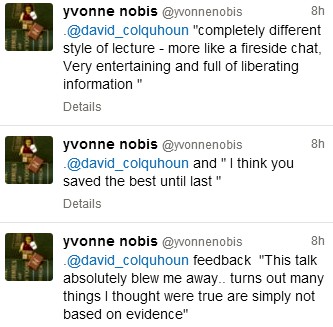
Our undercover investigation finds evidence of nutritional therapists giving out advice that could seriously harm patients’ health
That’s the title of an article in February’s Which? magazine. (That’s similar to Consumer Reports in the USA).
“When Which? sent researchers to investigate the quality of advice from nutritional therapists, some was so bad that patients’ health was put at risk. One nutritional therapist advised against surgery and radiotherapy to treat cancer, while another ‘diagnosed’ a problem with adrenal glands without any blood-test results. Some also used unproven testing, such as iridology or mineral testing, to identify problems or diagnose conditions.”
"We sent five undercover researchers to visit three nutritional therapists each. Every researcher was equipped with a specific health-related scenario: Helen (46) and Sarah (40), recently diagnosed with Ductal Carcinoma In Situ (DCIS), the most common type of non-invasive breast cancer; Mark (56) and Linda (52), suffering with serious fatigue for the past three months; and Emily (31), trying unsuccessfully to conceive for more than a year."
|
Sarah, posing as a patient diagnosed with DCIS, visited a nutritional therapist who advised her to delay treatment recommended by her oncologist (a lumpectomy and a course of radiotherapy). The therapist suggested that Sarah follow a no-sugar diet for three to six months and told her, ‘cancer lives off sugar; if you feed it sugar it’s going to thrive. If we starve the cancer of sugar then you have a better opportunity of the cancer going away’. When Sarah asked whether the cancer could progress during this time the therapist said it was a ‘gamble’. Dr Margaret McCartney, from our panel of experts, says: ‘If cancer treatment were as simplistic as cutting out sugar, surely we would have discovered a cure. This advice is highly irresponsible.’ Our experts rated this consultation as a ‘dangerous fail’." The Patients’ Guide to magic medicine defined “Nutritional therapy: self-styled ‘nutritionists’ making untrue claims about diet in order to sell you unnecessary supplements”. That turned out to be pretty accurate. They are part of the alternative medicine fringe. The Universities Admission Service (UCAS) no longer lists any BSc/MSc degrees in "Nutritional Therapy" or "Nutritional medicine". Westminster University closed its BSc Nutritional Therapy during last year. We still don’t know the fate of the notorious (or should I say hilarious) course run at the Northern College of Acupuncture and validated (after a fashion) by the late University of Wales, but it isn’t listed for entry in 2012. [We do now: see follow-up‘] But there are a large number of university courses called "Nutrition". How many of them teach properly, and how many of them teach the nonsense that prevails in "nutritional therapy", I don’t know. The term ‘nutrition’ has turned into a dangerous minefield. It can mean almost anything, because the term is undefined. Anyone can, and does, describe themselves as a nutritionist. At one extreme you have slick pills salesman like ‘not-a-Dr’ Gillian McKeith and Patrick Holford. At the other extreme you have a fascinating and respectable subject for study. The one thing that you need to get clear is that if you want advice about nutrition, go to a dietitian not a "nutritionist". Dietitians are the properly qualified people who work in the NHS, and who are (mostly) free of crackpot ideas. |
I suppose that one should not be surprised at the poor, and sometimes dangerous, advice that was given by nutritional therapists. Their training contains much nonsense so it isn’t surprising that they did so badly. Some of it has been revealed here. See, for example,
Another worthless validation: the University of Wales and nutritional therapy
Nutritional Fairy Tales from Thames Valley University
College of Natural Nutrition: bizarre teaching revealed
Nutriprofile: useful aid or sales scam?
Response to a threatening letter from Mr Holford
Food for the Brain: Child Survey. A proper job?
Teaching bad science to children: OfQual and Edexcel are to blame
The last BSc (Hons) Homeopathy closes! But look at what they still teach at Westminster University.
The level of knowledge of both physiology and chemistry shown my some of the therapists was shocking. One recommended avoiding margarine, because it’s “two chemical bonds away from pure plastic”. Another said that Flora margarine contains lots of trans fat, which has not been true for a long time.
One graduate ot the late Thames Valley University course said “”advantage of the wholemeal or the wholegrain … is that they contain more fibre and the fibre stops the sugars being absorbed quite as quickly”. Not so. Brown and white bread have much the same glycaemic index (60 – 70).
Quack diagnosis
One alarming fact was that several therapists offered methods of diagnosis for allergy and for deficiencies that have been known for many years not to work. There isn’t anything controversial about iridology, hair mineral analysis, taste tests. kinesiology. or the Vega test. They are pure quackery.
“Professor David Colquhoun, from our panel of experts, said: ‘Sadly, nutritional therapy is plagued by “diagnostic tests” that are little more than quackery; they are tools to aid sales, rather than tools to diagnose deficiencies. Iridology and hair analysis simply don’t work.”
Unnecessary treatments
One therapist advised a researcher to have an optimum nutritional evaluation test, costing £312, and a cellular nutrition profile, costing £156. Apparently, these would allow the therapist to give a
more targeted service by establishing what vitamin and mineral deficiencies he had.
Our experts were not convinced by these tests and certainly didn’t think they were worth the money; any necessary testing
could be done by a GP for free.
In 12 of the 15 consultations, researchers were prescribed a huge range of supplements, costing up to £70 per month. It was not revealed whether or not the prescriber made money from this, but usually you were asked to give the prescriber’s name "to get a discount". So it’s a fair guess that they got kickbacks.
British Association for Applied Nutrition & Nutritional Therapy (BANT)
Despite the low standards of advice, 13 out of the 14 therapists who were visited were registered with BANT, the British Association for Applied Nutrition & Nutritional Therapy. This is what passes for a professional association for nutritional therapists, though like all such bodies in alternative medicine, it is entirely ineffective as a regulator. Rather it serves to protect whatever untrue claims they make. BANT’s code of practice says that its members won’t diagnose, but in fact many of the therapists diagnosed conditions and created treatment plans. You can be confident that BANT will do nothing to stop this bad practice.
You can find out a lot about BANT from these sources:
British Association for Nutritional Therapy – when an organisation looks like a regulator, quacks like a regulator, but isn’t a regulator
Why it is easy to get the incorrect impression that BANT is a regulator
Nutritional Therapists Fail to Join Ofquack
BANT: A Profile
Matthias Rath drops his million pound legal case against me and the Guardian.
Only 3 of the 14 therapists were registered with the Complementary and Natural Healthcare Council (the CNHC, more commonly know as Ofquack). They are meant to be the official regulator, launched with a good chunk of taxpayers’ money, but registration is voluntary and not many have volunteered. As a requlator, Ofquack is a bad joke.
Conclusion
|
"Dr Margaret McCartney says: ‘This investigation appears to show that high street nutritional therapists are a waste of money. If you have symptoms please see your GP, not someone who can’t diagnose accurately.’ If you’re looking for tailored dietary advice, visit a registered dietitian.
" |
There is a discussion of this topic on the Which? magazine site.
Follow-up
The excellent Quackometer has posted simultaneously on the great nutritional therapy scam.
16 January 2012 The British Dietetic Association issued a press release that describes very clearly the many differences between a real dietitian and a "nutritional therapist". Download Leading UK Nutrition Association Urges Awareness Between Dietitians and Nutritionists (pdf).
16 January 2012 BANT issued a press release. Download Are Nutritional Therapists Gambling with Your Health?. It answers none of the serious questions raised by the Which? investigation. BANT moans that that Which? “did not provide all the promised transcripts/questionnaires in a timely fashion”. In fact they got them before Christmas and were given until January 15th to respond.
16 January 2012. BBC Radio 4 programme, You and Yours, had an item with Jenny Driscoll from Which? magazine and BANT chairperson, Catherine Honeywell. She did, inter alia, admit that some of the behaviour of the therapists were irresponsible. It remains to be seen if they do anything about it. don’t hold your breath. Hear it on BBC iPlayer.
16 January 2012. There was pretty god coverage of the story, even in the Daily Mail.
17 January 2012 Another question answered. I just learned that the ludicrous course in Nutritional Therapy, previously validated by the University of Wales (and a contributor to its downfall), is now being validated by, yes, you guessed, Middlesex University. Professor Driscoll seems determined to lead his univerity to the bottom of the academic heap. His new partnership with the Northern college of Acupuncture is just one of a long list of validations that almost rivals that of the late University of Wales. The course has, of course, an enthusiastic testimonial, from a student. It starts
I work full time as a team leader for a pension company but I am also a kinesiologist and work in my spare time doing kinesiology, reiki and Indian head massage.
Evidently she’s a believer in the barmiest and totally disproved forms of magic medicine. And Middlesex University will give her a Master of Science degree. I have to say I find it worrying that she’s a team leader for a pension company. Does she also believe in the value of worthless derivatives. I wonder?
17 January 2012 The discussion is going on at the Which? web site. A Chris James cast doubt on the reaults because ot the small sample size, and asked for confidence limits, so I gave them.
Chris James
It is easy enough to calculate limits yourself -you don’t even need to be able to do the maths -there are web calculators that do it for you, e.g. http://www.causascientia.org/math_stat/ProportionCI.html
14/15 = 93% failed. 95% confidence limits for this are 69.8% to 98.4%
6/15 = 40% gave dangerous advice 95% confidence limits 19.7% to 64.6%
So despite the small sample size we can say that it’s likely that at least 70% (and possibly 98%) of nutritional therapists fail.
And it is likely that at least 20% (and possibly 65%) of nutritional therapists give dangerous advice.
These results give real cause for concern, despite the small sample size.
For statistical enthusiasts, these limits are Bayesian with a uniform prior. Very much the same result is given by the standard analysis which is explained in section 7.7 of Lectures on Biostatistics [download pdf 10.5 Mb]
18 January 2012. BANT has, at last, produced an “updated response”. The good thing is that it starts by saying
” . . it is completely outside the BANT Code of Practice to advise a client to withhold any treatment for cancer for any period of time in order to follow a nutritional approach. Were a client to be advised in such a way we would expect to receive a complaint against the practitioner.”
I hope that this will happen. This statement, the only admission of guilt in BANT’s response, is rather spoiled by a later suggestion that no such recommendation was made. It looked very clear to both Which? magazine and to the three members of the expert panel.
The rest of the response admits no fault of any sort.
I’m sorry to say that the response by BANT shows very clearly what is wrong in nutritional therapy. Any organisation which can see nothing wrong in the advice given in 14 of the 15 consultations is, I’d argue, a threat to the health of the nation. Rather than saying we’ll try to improve, they just deny everything.
The response seems to show that the professional organisation for nutritional therapists is not part of the solution. Rather it is part of the problem.
Since writing about anti-scientific degrees in Nature (March 2007), much has been revealed about the nonsense that is taught on these degrees. New Year’s day seems like a good time to assess how far we’ve got, five years on.
At the beginning of 2007 UCAS (the universities central admission service) offered 45 different BSc degrees in quackery, at 16 universities.
Now there are only 24 such degrees.
If you exclude chiropractic and osteopathy, which all run at private colleges, with some sort of "validation" from a university, there are now only 18 BSc/MSc courses being offered in eight universities.
Degrees in homeopathy, naturopathy and "nutritional therapy", reflexology and aromatherapy have vanished altogether from UCAS.
In the race to provide BScs in anti-science, Middlesex University has now overhauled the long-standing leader, Westminster, by a short head.
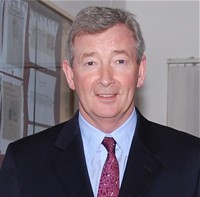 Michael Driscoll, vice-chancellor of Middlesex |
|
Let’s see what’s gone.
The University of Central Lancashire (UCLAN) was the first to see sense. In August 2008 they announced closure of their “BSc” degree in homeopathy. On September 2008 they announced an internal review of their courses in homeopathy. herbalism and acupuncture. The report of this review closed down all of them in July 2009. I first asked for their teaching materials in July 2006. I finally got them in December 2010, after winning an appeal to the Information Commissioner, and then winning an appeal against that decision at an Information tribunal . By the time I got them, the course had been closed for over two years. That is just as well, because it turned out that UCLAN’s students were being taught dangerous nonsense. No wonder they tried so hard to conceal it.
Salford University was the next to go. They shut down their courses in complementary medicine, homeopathy and acupuncture. In January 2009 they announced " they are no longer considered “a sound academic fit” ". Shortly afterwards. a letter appeared in The Times from three heavyweights (plus me) congratulating the vice-chancellor on his decision.
University of Westminster
For many years, Westminster was the biggest supplier of BSc degrees in quackery. At the beginning of 2007 they offered 14 different BSc degrees in homeopathy, naturopathy, nutritional therapy, "complementary therapies", (western) herbal medicine and traditional Chinese medicine with acupuncture. Some of their courses were so bizarre that some of the students and even staff sent me slides which taught things like "amethysts emit high Yin energy". Like UCLAN, Westminster also held an internal review. Unlike UCLAN it came to the absurd conclusion that all would be well if they injected more science into the courses. The incompetence of the review meant that those who wrote it hadn’t noticed that if you try to put science into homeopathy or naturopathy, the whole subject vanishes in a puff of smoke. Nevertheless Westminster closed down entry to BSc homeopathy in March 2009 (though the subject remained as part of other courses).
Three years after the Nature article, all five BSc homeopathy degrees had shut their doors.
During 2011, Westminster shut down Naturopathy, Nutritional therapy, Therapeutic bodywork and Complementary Medicine. See, for example,
More dangerous nonsense from the University of Westminster: when will Professor Geoffrey Petts do something about it?
Now Westminster has only four courses in two subjects. They still teach some dangerous and untrue things, but I suspect the writing is on the wall for these too.
I have seen a document, dated 11 April 2011, which states
“The following courses have been identified as ‘at risk’ (School definition) and will be discussed at the APRG and University Review Group2, due to poor recruitment and high cost of delivery:
Integrated Health Scheme: BSc Complementary Medicine, Naturopathy; BSc Chinese Medicine; BSc Nutritional Therapy; BSc Herbal Medicine”
All but Chinese medicine and Herbal medicine have already gone. Almost there.
University of Wales
Since my first post in 2008 about the validation scam operated by the University of Wales, and some good investigations by BBC Wales TV, the outcome was the most spectacular so far. The entire institution collapsed. They no longer "validate" external degrees at dodgy business colleges, loony religious colleges or magic medicine colleges.
Another worthless validation: the University of Wales and nutritional therapy (October 2008) This is a ‘degree’ in nutrtional therapy. It is even more hilarious than usual, but it passed the validation anyway.
Scandal of the University of Wales and the Quality Assurance Agency (November 2010). This post followed the BBC Wales TV programme. At last the QAA began to notice, yet further confirmation of its utter ineptitude.
The University of Wales disgraced (but its vice chancellor is promoted) (October, 2011) The eventual collapse of the university was well-deserved. But it is very weird that the people who were responsible for it have still got their jobs. In fact the vice-chancellor, Marc Clement, was promoted despite his mendacious claim to be unaware of what was going on.
It remains to be seen how many of the many quack courses that were validated by the University of Wales will be taken on by other universities. The McTimoney College of Chiropractic is owned by BPP University (so much for their quality control, as explained in Private Eye). but still claims to be validated by Wales until 2017.
Some of the more minor players
Edinburgh Napier University. After an FOI request (rejected), Napier closed their herbal medicine degree in 2010.
Hot and cold herbal nonsense from Napier University Edinburgh: another course shuts. (June 2010)
As expected, the Scottish Information Commissioner agreed with that for England and Wales and ordered material to be sent. Edinburgh Napier University teaches reflexology, aromatherapy and therapeutic touch. Scottish Information Commissioner says you should know. Some of the horrors so discovered appeared in Yet more dangerous nonsense inflicted on students by Edinburgh Napier University. The embarrassment seems to have worked. Their remaining degrees in aromatherapy and reflexology have now vanished from UCAS too. All that remains is a couple of part time “Certificates of Credit” for aromatherapy and reflexology
Anglia Ruskin Univerity Not only have BSc degrees gone in aromatherapy and reflexology, but their midwifery degree now states "We are unable to accept qualifications in aromatherapy, massage and reflexology."
University of Derby Reflexology and aromatherapy have gone, though doubtless Spa management therapies have much nonsense left
University of Greenwich. BSc in Complementary Therapies (Nutritional Health) and BSc in Complementary Therapies (Nutritional Health) have been shut. The BSc Acupuncture is listed on their web site but it is under review, and is not listed in UCAS for 2012. (Acupuncture is run at International College of Oriental medicine, validated by Greenwich.). Only osteopathy (MOst) is still running, and that is a validation of an external course run at The European School of Osteopathy, in Maidstone
Thames Valley University was renamed the University of West London in 2010. The nonsense that was run there (e.g. Nutritional Fairy Tales from Thames Valley University) seems to have vanished. Their previous alt med guru, Nicola Robinson, appears now to be at London South Bank University (ranked 116 out of the 116 UK universities)
What’s left?
Chiropractic Surprisingly, given the total discreditation of chiropractic in the wake of the Simon Singh affair, and the internecine warfare that followed it, none of the chiropractic courses have shut yet. Some are clearly in trouble, so watch this space.
Osteopathy has also had no course closures since 2007. Like chiropractic it also suffers from internecine warfare. The General Osteopathic Council refuses to disown the utter nonsense of "craniosacral" osteopathy. But the more sensible practitioners do so and are roughly as effective as physiotherapists (though there are real doubts about how effective that is).
Excluding chiropractic and osteopathy, this is all that’s left. It now consists almost entirely of Chinese medicine and a bit of herbal.
Glyndwr university (Known as North East Wales Institute until 2008) Ranked 104 out of 116 UK universities
BSc Acupuncture (B341) BSc
BSc Complementary Therapies for Healthcare (B343)
Cardiff Metropolitan University (UWIC) (Known as University of Wales Institute Cardiff (UWIC) until Nov 2011.) The vice-chancellor of Cardiff Metropolitan, Antony Chapman, is in the QAA’s board of directors, so perhaps it isn’t surprising that the QAA has done nothing.
BSc Complementary Therapies (3 years) (B390)
BSc Complementary Therapies (4 yrs inc Foundation) (B300)
University of Lincoln
Acupuncture (B343) 3FT Hon BSc
Herbal Medicine (B342) 3FT Hon BSc
University of East London Ranked 113 out of 116 UK universities
Acupuncture (B343) 3FT Hon BSc
London South Bank University Ranked 116 out of 116 UK universities
Acupuncture (B343) 4FT Deg MCM
The Manchester Metropolitan University Ranked 93 out of 116 UK universities
Acupuncture (B343) 3FT Hon BSc
Middlesex University
Acupuncture (B348) 3FT Hon BSc
Ayurvedic Medicine (A900) 4FT Oth MCM
Herbal Medicine (B347) 3FT Hon BSc
Traditional Chinese Medicine (BT31) 4FT Hon BSc
University of Westminster
Chinese Medicine: Acupuncture (B343) 3FT Hon BSc
Chinese Medicine: Acupuncture with Foundation (B341) 4FT/5FT Hon BSc/MSci
Herbal Medicine (B342) 3FT Hon BSc
Herbal Medicine with Foundation Year (B340) 4FT/5FT Hon BSc/MSci
It seems that acupuncture hangs on in universities that are right at the bottom of the rankings.
Manchester Metropolitan gets the booby prize for actually starting a new course, just as all around are closing theirs. Dr Peter Banister, who was on the committee that approved the course (but now retired), has told me ” I am sceptical in the current economic climate whether it will prove to be successful”. Let’s hope he’s right.
But well done Westminster. Your position as the leader in antiscientific degrees has now been claimed by Middlesex University. Their "degrees" in Ayurveda mark out Middlesex University as the new King of Woo.
Over to you, Professor Driscoll. As vice-chancellor of Middlesex University, the buck stops with you.
Both still teach Chinese and herbal medicine, which are potentially dangerous. There is not a single product from either that has marketing authorisation from the MHRA, though the MHRA has betrayed its trust by allowing misleading labelling of herbal medicines without requiring any evidence whatsoever that they work, see, for example
Why degrees in Chinese medicine are a danger to patients
More quackedemia. Dangerous Chinese medicine taught at Middlesex University
Why does the MHRA refuse to label herbal products honestly? Kent Woods and Richard Woodfield tell me
Sub-degree courses
In contrast to the large reduction in the number of BSc and MSc degrees, there has actually been an increase in two year foundation degrees and HND courses in complementary medicine, at places right near the bottom of the academic heap. The subject is sinking to the bottom. With luck it will vanish entirely from universities before too long.
Research-intensive Universities
Although all of the degrees in magic medicine are from post-1992 universities, the subject has crept into more prestigious universities. Of these, the University of Southampton is perhaps the worst, because of the presence of George Lewith, and his defender, Stephen Holgate. Others have staunch defenders of quackery, including the University of Warwick, University of Edinburgh and St Batholomew’s.
Why have all these courses closed?
One reason is certainly the embarrassment caused by exposure of what’s taught on the courses. Professors Petts (Westminster) and Driscoll (Middlesex) must be aware that googling their names produces references to this and other skeptical blogs on the front page. Thanks to some plain brown emails, and, after a three year battle, the Freedom of Information Act, it has been possible to show here the nonsense that has been foisted on students by some universities. Not only is this a burden on the taxpayer, but, more importantly, some of it is a danger to patients.
When a course closes, it is often said that it is because of falling student numbers (though UCLAN and Salford did not use that excuse). Insofar as that is true, the credit must go to the whole of the skeptical movement that has grown so remarkably in the last few years. Ben Goldacre’s "ragged band of bloggers" have produced a real change in universities and in society as a whole.
The people who should have done the job have either been passive or an active hindrance. The list is long. Vice-chancellors and Universities UK (UUK), the Quality Assurance Agency (QAA), the Hiigher Education Funding Council England (HEFCE), Skills for Health, the Medicines and Health Regulatory Authority ( MHRA) , the Health Professions Council (HPC), the Department of Health, the Prince of Wales and his reincarnated propaganda organisation, the "College of Medicine", the King’s Fund, the Universities and Colleges Union (UCU), OfQual, Edexcel, National Occupational Standards and Qualifications and the Curriculum Authority (QCA).
Whatever happened to that "bonfire of the quangos"?
Follow-up
2 January 2012 The McTimoney College of Chiropractic (owned by BPP University) claims that its “validation” by the University of Wales will continue until 2017. This contradicts the statement from UoW. Watch this space.
3 January 2012. Thanks to Neil O’Connell for drawing my attention to a paper in Pain. The paper is particularly interesting because it comes from the Southampton group which has previously been sympathetic to acupuncture. Its authors include George Lewith. It shows, yet again that there is no detectable difference between real and sham acupuncture treatment. It also shows that the empathy of the practitioner has little effect: in fact the stern authoritarian practitioner may have been more effective.
Patients receiving acupuncture demonstrated clinically important improvements from baseline (i.e., a 29.5% reduction in pain), but despite this, acupuncture has no specific efficacy over placebo for this group of patients. The clinical effect of acupuncture treatment and associated controls is not related to the use of an acupuncture needle, nor mediated by empathy, but is practitioner related and may be linked to the perceived authority of the practitioner.”
Sadly. the trial didn’t include a no-treatment group, so it is impossible to say how much of the improvement is regression to the mean and how much is a placebo effect. The authors admit that it could be mostly the former.
Surely now the misplaced confidence in acupuncture shown by some medical and university people must be in tatters.
In yet another sign that even acupuncture advovates are beginning to notice that it doesn’t work, a recent article Paradoxes in Acupuncture Research: Strategies for Moving Forward, shows some fascinating squirming.
3 January 2012. The Daily Telegraph has carried a piece about closure of university courses, written by Michael Hanlon. On 31 January they carried a much longer piece.
3 January 2012. It is a great pity that some physiotherapists seem to have fallen hook, line and sinker for the myths of acupuncture. Physiotherapists are, by and large, the respectable face of manipulative therapy. Their evidence base is certainly not all one would wish, but at least they are free of the outrageous mumbo humbo of chiropractors. Well, most of them are, but not the Acupuncture Association of Chartered Physiotherapists (AACP), or, still worse, The Association of Chartered Physiotherapists in Energy Medicine, a group that is truly away with the fairies. These organisations are bringing a very respectable job into disrepute. And the Health Professions Council, which is meant to be their regulator, has, like most regulators, done nothing whatsoever to stop it.
5 January 2012. Times Higher Education gives a history of the demise of the University of Wales, Boom or Bust. It’s a useful timeline, but like so many journalists, it’s unwilling to admit that bloggers were on to the problem long before the BBC, never mind the QAA.
There was also a leader on the same topic, Perils of the export business. It again fails to take the QAA to task for its failures.
Interviews for Deutsche Welle and Middle East Broadcasting Center TV.
17 January 2012 Another question answered. I just learned that the ludicrous course in Nutritional Therapy, previously validated by the University of Wales (and a contributor to its downfall), is now being validated by, yes, you guessed, Middlesex University. Professor Driscoll seems determined to lead his univerity to the bottom of the academic heap. His new partnership with the Northern college of Acupuncture is just one of a long list of validations that almost rivals that of the late University of Wales. The course has, of course, an enthusiastic testimonial, from a student. It starts
I work full time as a team leader for a pension company but I am also a kinesiologist and work in my spare time doing kinesiology, reiki and Indian head massage.
Evidently she’s a believer in the barmiest and totally disproved forms of magic medicine. And Middlesex University will give her a Master of Science degree. I have to say I find it worrying that she’s a team leader for a pension company. Does she also believe in the value of worthless derivatives. I wonder?
18 January 2012. the story has gone international, with an interview that I did for Deutsche Welle, UK universities drop alternative medicine degree programs. I’m quoted as saying “They’re dishonest, they teach things that aren’t true, and things that are dangerous to patients in some cases”. That seems fair enough.
There is also an interesting item from July 2010 about pressure to drop payment for homeopathy by German health insurance
31 January 2012
The Daily Telegraph carried a prominent 1200 word account (the title wasn’t mine). The published version was edited slightly.
One of my first posts about nonsense taught in universities was about the University of Westminster (April 2008): Westminster University BSc: “amethysts emit high yin energy”. since then, there have been several more revelations.
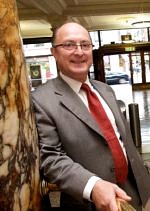 Professor Petts |
The vice-cnancellor of Westminster, Professor Geoffrey Petts, with whom the buck stops, did have an internal review but its report was all hot air and no action resulted (see A letter to the Times, and Progress at Westminster). That earned Professor Petts an appearence in Private Eye Crystal balls. Professor Petts in Private Eye (and it earned me an invitation to a Private Eye lunch, along with Francis Wheen, Charlie Booker, Ken Livingstone . . ). It also earned Petts an appearence in the Guardian (The opposite of science). |
By that time Salford University had closed down all its CAM, and the University of Central Lancashire was running an honest internal review which resulted in closure of (almost) all of their nonsense degrees. But Westminster proved more resistant to sense and, although they closed down homeopathy, they still remain the largest single provider of degrees in junk medicine. See, for example More make-believe from the University of Westminster. This time it’s Naturopathy, and
The last BSc (Hons) Homeopathy closes! But look at what they still teach at Westminster University.
It’s interesting that Westminster always declined to comply with Freedom of Information requests, yet I had more from them than from most places. All the information about what’s taught at Westminster came from leaks from within the university. Westminster has more moles than a suburban garden. They were people with conscience who realised that the university was harming itself. They would claim that they were trying to save the university from some remarkably bad management. I claim also that I’m working in the interests of the university.
In the wake of the victory at the Information Tribunal, I sent a Freedom of Information Act (FOIA) request for for samples of teaching materials from all of their courses. This time they couldn’t legally refuse. The first batch has just arrived, so here are a few selected gems of utter nonsense. Well, it is worse than nonsense because it endangers the health of sick people.
A letter to the university from a student
Before getting on to the slides, here’s a letter that was supplied under FOIA. It was sent anonymously to the university. I was told that this was the only letter of complaint but I happen to know that’s not true so I’ve asked again. This one was forwarded to the vice-chancellor in 2008, and to the review committee. Both seem to have ignored it. Judging from the wording, one would guess that it came from one of their own undergraduates. :Here are some extracts.[download whole letter]
|
It is a flagrant contradiction of a ‘science’ in the BSc to have these practices, but it also jeopardises our profession, which is under DoH review and being constantly attacked in the media Gustifiable I suggest). We are taught that simply tasting plant tinctures can tell us which part of the body they work. on and what they do in the body. We are given printed charts with an outline of the body on to record our findings on. This is both nonsense, but is dangerous as it implies that the pharmacology of plant tinctures can be divined by taste alone. In class we are taught that we can divine the drug actions or use of an unknown plant simply by tasting an alcohol extract. Science? or dangerous fantasy. There are lecturers taking clinics who allow students to dowse and partake themselves in dowsing or pendulums to diagnose and even to test suitability of plant drugs. Dowsing is taught to us by some lecturers and frowned upon by others but we feel it brings the herbal medicine into a poor light as it is unscientific and bogus nonsense. We are concerned that we have seen the course leader brush over this practice as though she is frightened to make a stand. |
The letter seems to refer to a course in herbal medicine. That is a subject that could be studied scientifically, though to do so would leave students unemployed because so few herbal treatments have been shown to work. It obviously is not being studied scientifically: but even teaching students about dowsing and pendulums does not seem to have stirred the vice-chancellor into action.
David Peters: wishful thinking?
David Peters is a nice man. He’s the Clinical Director of Westminster’s School of Integrated Health. I debated with him on the excellent Radio 4 Programme, Material World.
His lecture on "Complementary Healthcare in the NHS" showed some fine wishful thinking.
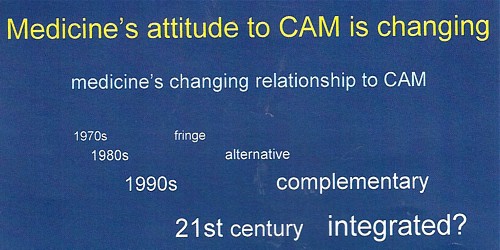
It shows the progress of the euphemisms that quacks use to try to gain respectability, but little else. Interestingly, later slides show a bit more realism.
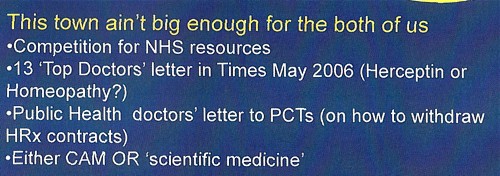
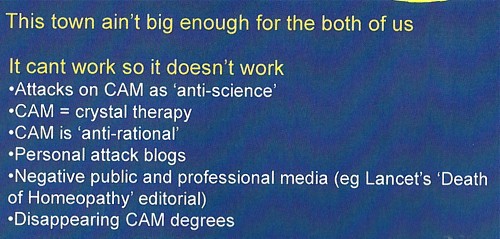
So he has noticed that the tide has turned and that a lot of people are no longer willing to be palmed off with new age gobbledygook. And yes, courses are shutting. Perhaps his course will be the next to shut?
According to an internal Westminster email that found its way to me,
The following courses have been closed/identified for closure due to poor recruitment :
- BSc degrees in Homeopathy and Remedial Massage & Neuromuscular Therapy, students completing by September 2011
- MA degrees in International Community development, Community development and Faith-based Community development, students completing by September 2011
- BSc degree Complementary Medicine
- Graduate diploma BMS
The following courses have been identified as ‘at risk’ (School definition) and will be discussed at the APRG and University Review Group2, due to poor recruitment and high cost of delivery:
- Integrated Health Scheme: BSc Complementary Medicine, Naturopathy; BSc Chinese Medicine; BSc Nutritional Therapy; BSc Herbal Medicine
The BSc (Hons) degree in naturopathy
Naturopathy us pretty bizarre, because it consists largely of doing nothing at all, beyond eating vegetables . Being ill is good for you.
Perhaps the best source to judge claims is the US National Center for Complementary and Alternive Medicine (NCCAM), a branch of the National Institutes of Health. This is the outfit that has spent over a billion dollars of US taxpayers’ money testing alternative medicines and for all that money has not come up with a single useful treatment. They never link to any sort of critical comment, and are nothing if not biassed towards all things alternative. If they can’t come up with evidence. nobody can. Two useful links to NCCAM are Herbs at a glance, and Health Topics A – Z.
Uses of herbal teas in naturopathic dietary care
I was sent a set of over 50 slides on "Herbal Teas/Decoctions (3CMWS03, 1/02, Uses of herbal teas in naturopathic dietary care). About half of them amount to little more than ‘how to make a cup of tea’. but then we get onto uses, but then a lot of fantasy ensues.
What NNCAM says about dandelion. There is no compelling scientific evidence for using dandelion as a treatment for any medical condition.
What Westminster says
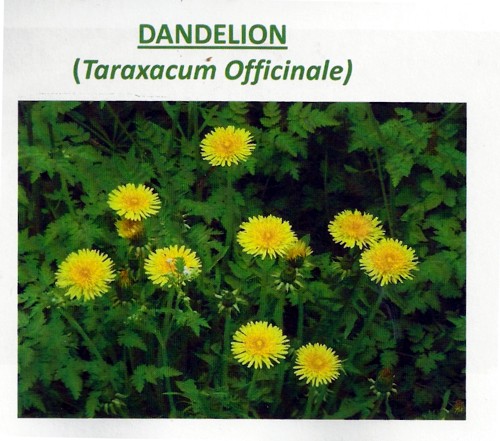
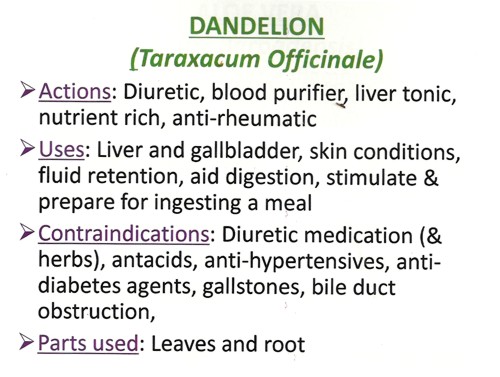
Well I know what a diuretic is, but "blood purifier" and "liver tonic" are meaningless gobbledygook. We’ve been through this before with Red Clover (see Michael Quinion’s .look at the term "blood cleanser"). Using words like them is the very opposite of education.
What NCCAM says.about chamomile: Chamomile has not been well studied in people so there is little evidence to support its use for any condition.
What Westminster says
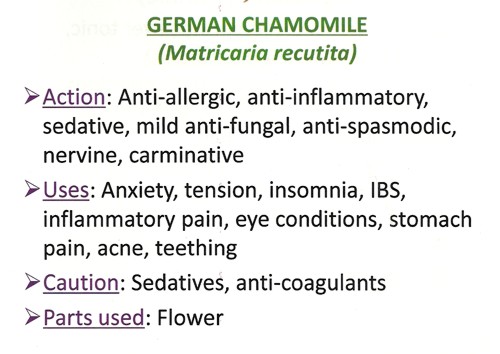
So, judging by NCCAM, these claims are unjustified. It’s teaching folk-lore as though it meant something.
More dangerous advice comes when we get to the ‘repertories’.
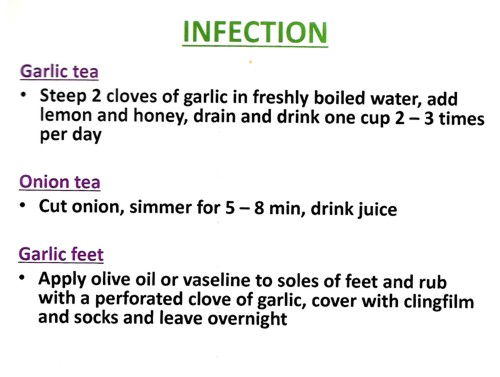
Infections can kill you, They are one of the modest number of things that pharmacology can usually cure, rather than treat symptomatically. If you go to a Westminster-trained naturopath with a serious infection and follow their advice to put garlic in your socks, you will not just be smelly, You could die.
Allergy and Intolerance 3CMwS03 18/02
|
Treating allergies, misdiagnosed by fraudulent tests, is very big business for the ‘health food industry’, This lecture, by R. Newman Turner ND, DO, BAc, started tolerably but descended to a nadir when it mentions, apparently seriously, two of the best known fraudulent methods of allergy diagnosis, the Vega test and "Applied Kinesiology". Kinesiology Sounds sort of sciencey, but Applied Kinesiology is actually a fraudulent and totally ineffective diagnostic method invented by (you guessed) a chiropractor. It has been widely used by alternative medicine to misdiagnose food allergies. It does not work (Garrow, 1988: download reprint). |
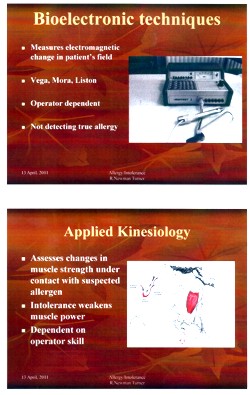
|
Could this be the same R Newman Turner who wrote a book on Naturopathic First Aid? The mind boggles.
Naturopathic Detoxification 23 CMES03 25/02 Detox Myth of Fact
|
This lecture was the responsibility of Irving S Boxer ND DO MRN LCH, a naturopath, homeopath and osteopath in private practice. Don’t be fooled by the implied question in the title. It might have been taken to suggest a critical approach. Think again. There is all the usual make-believe about unspecified and imaginary toxins that you must get rid of with enemas and vegetables. |
|
|
The skin brushing does not quite plumb the depths of Jacqueline Young’s Taking an air bath , but presumably it is something similar. "Liver activation" by castor oil packs is pure unadulterated gobblydygook. The words mean nothing. Their attempt to divide all foods into those that cleanse and those that clog sounds reminiscent of the Daily Mail’s ontological oncology project. |
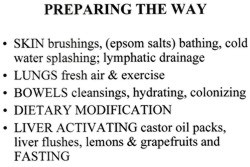 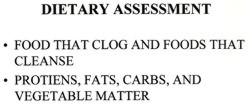
|
The practice of healing (3CMSS01 2/12)
Next we retreat still further into fantasy land
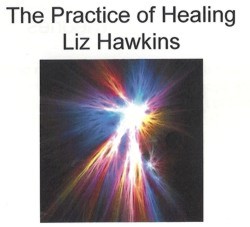
|
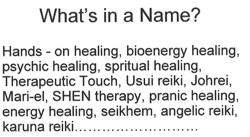
|
All pure hokum, of course’ She could have added "craniosacral therapy" (at present the subject of a complaint against the UCL Hospitals Trust (that’s the NHS, not UCL) to the Advertising Standards Authority,
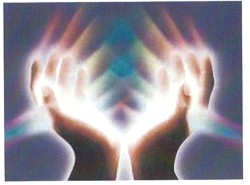 |
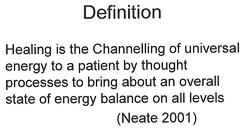 |
Is that definition quite clear?
In fact this sort of nonsense about rays coming from your hands was disproved experimentally, in a rather famous paper, the only paper in the Journal of the American Medical Association to have been written by a 9-year old. Emily Rosa. She (with some help from her parents) devised a simple test for her 4th (US) grade science fair project. It was later repeated under more controlled conditions and written up for JAMA [download reprint] . It showed that the claims of ‘therapeutic touch" practitioners to be able to detect "auras" were totally false. No subsequent work has shown otherwise. Why, then, does the University of Westminster teach it as part of a Bachelor of Science degree?
You can see Emily Rosa herself explain why “therapeutic touch is bullshit” with Penn and Teller, in Penn and Teller Expose Therapeutic Touch.
Environmental stress
The last bit of hokum (for the moment) is one of the best. This one has every myth under the sun (including some I hadn’t heard of).
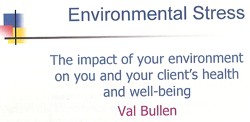
|
The lecturer, Val Bullen, was also responsible for the infamous "Amethysts emit high Yin energy" slide. One of her own students desribes her as "sweet but deluded". I have nothing against Ms Bullen, She can believe whatever she wants. My problem is with the vice-chancellor, Prof Geoffrey Petts, who seems to think that this sort of stuff is appropriate for a BSc. |
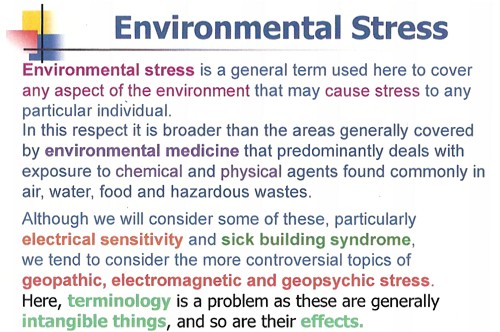
|
Everything barmy is here. Mobile phones, power lines, underwater streams, ley lines, sick building syndrome, are all reasons why you don’t feel 100 percent, Actually my reason is having to read this junk. The "definitions" are, as always, just meaningless words.
|
But don’t despair. Help is at hand.
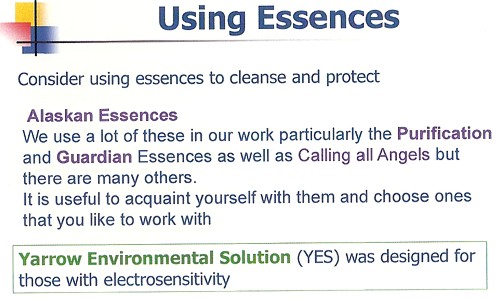
Just in case you happen to have run out of Alaskan Calling All Angels Essence, you can buy it from Baldwin’s for £19.95. It’s "designed to invoke the nurturing, uplifting and joyful qualities of the angelic kingdom.", and what’s more "can also use them any time to cleanse, energize, and protect your auric field." Well that’s what it says.in the ad.
Yarrow Environmental Solution looks like good stuff too. Only £7.95 for 7.5 ml. For that you get a lot. It will
" . . strengthen and protect against toxic environmental influences, geopathic stress, and other hazards of technology-dominated modern life. This includes the disruptive effects of radiation on human energy fields from X-rays, televisions, computer monitors, electromagnetic fields, airplane flights or nuclear fall-out."
OK stop giggling. This is serious stuff, taught in a UK university as part of a BSc degree, and awarded a high score by the Quality Assurance Agency (QAA).
Professor Petts, are you listening? I believe it is you, not I, who is bringing your university into disrepute.
The slides shown here are copyright of the University of Westminster or of the author of the lecture. They are small sample of what I was sent and are reproduced under the “fair quotation” provision, in the public interest.
Follow-up
5 May 2011. By sheer coincidence, Emily and Linda Rosa were passing through London. They called for lunch and here’s a picture (with Ben Goldacre) in UCL’s (endangered) Housman room. Linda kindly gave me a copy of her book Attachment Therapy on Trial: The Torture and Death of Candace Newmaker. [Download reprint of Rosa’s paper..]
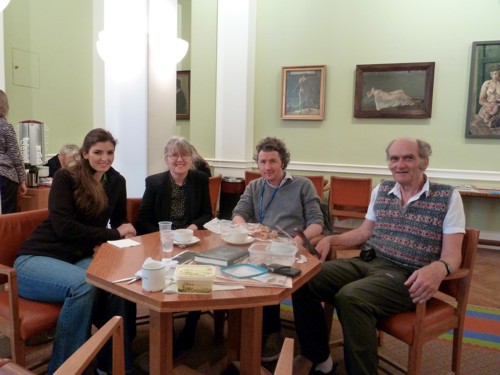
.
6 May 2011. Talking of the “vibrational medicine” fantasy, I had an email that pointed out a site that plumbs new depths in fantasy physics. It’s on the PositiveHealthOnline website: A post there, Spirals and Energy in Nature, was written by Robert McCoy. He claims to have worked on microprocessor layout design, but anyone with school physics could tell that the article is sheer nonsense. In a way it is much more objectionable that the silly slides with coloured rays used in the Westminster course. McCoy’s post seeks to blind with sciencey-sounding language, that in fact makea no sense at all. Luckily my retweet of the site attracted the attention of a real physicist, A.P. Gaylard, who made a very welcome return to blogging with Fantasy physics and energy medicine. He dismantles the physics, line-by-line, in a devastating critique. This sort of junk physics is far more dangerous than the perpetual motion pundits and the cold-fusion fantasists. At PositiveHealthOnline it is being used to push pills that do you no good and may harm you. It is a danger to public health.
There is no topic more widely discussed than what one should eat in order to stay healthy. And there are few topics where there evidence is so lacking in quality. This post isn’t about quackery, but about something much more important. it is about the real science (if it merits that description) behind dietary advice. I’m not an expert in nutrition, but I do know a bit about the nature of evidence. I’m continually astonished by the weakness of the evidence for some things that have become received truths, and nowhere is that more true than in nutrition.
|
The BMJ used my review of Gary Taube’s book, The Diet Delusion, to start off their new Round Table feature [full text link to BMJ]. The published version had some big cuts so I publish the original version here. Taubes was kind enough to send me a copy of the book after I’d mentioned his wonderful New York Times piece in my previous excursion into the murky world of diet and health, Diet and health. What can you believe: or does bacon kill you? |
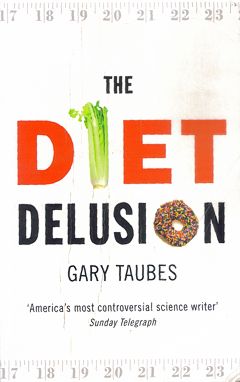
|
The biggest omission in the BMJ version was Taubes’ own ten point summary of his conclusions (on page 454).
"“As I emerge from this research, though, certain conclusions seem inescapable to me, based on existing knowledge
- Dietary fat, whether saturated or not, is not a cause of obesity, heart disease, or any other chronic disease of civilization
- The problem is the carbohydrates in the diet, their effect on insulin secretion, and thus the hormonal regulation of homeostasis – the entire harmonic ensemble of the human body. The more easily digestible and refined the carbohydrates, the greater the effect on our health, weight, and well-being.
- Sugars – sucrose and high-fructose corn syrup specifically – are particularly harmful, probably because the combination of fructose and glucose simultaneously elevates insulin levels while overloading the liver with carbohydrates.
- Through their direct effect on insulin and blood sugar, refined carbohydrates, starches, and sugars are the dietary cause of coronary heart disease and diabetes. They are the most likely dietary causes of cancer, Alzheimer’s disease, and the other chronic diseases of civilization.
- Obesity is a disorder of excess fat accumulation, not overeating, and not sedentary behaviour.
- Consuming excess calories does not cause us to grow fatter, any more than it causes a child to grow taller. Expending more energy than we consume does not lead to long-term weight loss; it leads to hunger.
- Fattening and obesity are caused by an imbalance – a disequilibrium – in the hormonal regulation of adipose tissue and fat metabolism. Fat synthesis and storage exceed the mobilization of fat from the adipose tissue and its subsequent oxidation. We become leaner when the hormonal regulation of the fat tissue reverses this balance.
- Insulin is the primary regulator of fat storage. When insulin levels are elevated – either chronically or after a meal – we accumulate fat in our fat tissue. When insulin levels fall, we release fat from our fat tissue and use it for fuel.
- By stimulating insulin secretion, carbohydrates make us fat and ultimately cause obesity. The fewer carbohydrates we consume, the leaner we will be.
- By driving fat accumulation, carbohydrates also increase hunger and decrease the amount of energy we expend in metabolism and physical activity.”
It is on these bases that Taubes suggests that the increase in obesity is, in part, a consequence of the recommendation of a low fat, and hence high sugar diet.
|
The Diet Delusion [ pp 601] (published in the USA as Good Calories, Bad Calories) Gary Taubes 2008 There is no topic more widely discussed than what one should eat in order to stay healthy. And there are few topics where the evidence is so lacking in quality. It is also a topic that is besieged by gurus, cranks and supplement hucksters. You need to beware of misleading titles. Dietitians are good. Nutritionists are sometimes good. But titles like ‘nutritional therapist’ and ‘nutritional medicine’ are usually warning signs of alternative therapists and/or pill salespeople. Gary Taubes is a journalist, but he is quite an exceptional journalist. His account of the importance of randomisation for the establishment of causality is one of the best ever and it was published not in an academic journal, but in the New York Times [1]. His book, The Diet Delusion, is in the same mould. It is more complete and more scholarly than most professional scientists could manage. Not only does it cover the literature right back to Samuel Johnson, but it is also particularly good at unravelling what one might call the politics of science. And by politics I don’t mean the vast lobbying industry that has built up with the aim of selling you unnecessary supplements, but the politics of academia. Obesity sounds simple. If you are fat it is because you eat too much or exercise too little, right? Well no, it’s not as simple as that. For a start, it has been shown time and time again that low fat diets, and exercise, have small and temporary effects on weight. The problem with diet and health revolves round causality. The law of conservation of energy is an inevitable truth, but says nothing about causality. It could imply that you get fat because you eat too much, or equally the causal arrow could point the other way and “we eat more, move less and have less energy to expend because we are metabolically or hormonally driven to get fat”. The assumption that positive caloric balance is the cause of weight gain has predominated since the 1970s and “this simple misconception has led to a century of misguided obesity research”. At the heart of the problem is the paucity of randomised trials, which are the only way to establish causality. Those that there are have usually shown that diet does not matter as much as we are told. Taubes concludes
I think it can certainly be argued that the problem of causality has been greatly underestimated. We are warned constantly of the dangers of processed meat, on the basis of very unconvincing evidence [2]. This is one reason why we still know so little about the causes of obesity, diabetes and heart disease. For Taubes, a major villain was the US nutritionist Ancel Keys (1904 – 2004). His It is quite possible that there was rather more to be said for the Atkins diet than was apparent at the time. The fact that Atkins was not a university scientist, that his views were extreme and that he was so obviously out to make a lot of money from it, gave him all the appearance of being yet another profiteering diet guru. He was dismissed by the medical establishment as a quack. Taubes points out that conflict of interest cuts both ways. Atkins’ sternest critics at Harvard were funded by General Foods, Coca-Cola and the sugar industry. It adds up to a sorry story of a conflict of vested interests and scientific vanity. Taubes’ final judgement is harsh. He quotes Robert Merton’s description [4] of what science is, or should be.
He then comments
It took Taubes five years to write this book, and he has nothing to sell apart from his ideas. No wonder it is so much better than a scientist can produce. Such is the corruption of science by the cult of managerialism that no university would allow you to spend five years on a book [5]. I find all ten points in his summary convincing. But his most important conclusion is that you cannot have any certainty without randomised trials. The business of nutrition is greatly at fault for not having put more effort into organising randomised trials. Until they are done, we’ll never really know, and we shouldn’t pretend that we do. 1. Taubes G. Do we really know what makes us healthy? New York Times 2007 Sep 16.[full text link] [pdf file] 2. Colquhoun, D. (3 May 2009) Diet and health. What can you believe: or does bacon kill you?. 3. Greenberg, S.A.. 2009 How citation distortions create unfounded authority: analysis of a citation network. BMJ ;339:b2680 [pdf file]. 4. Merton, R. K. Behavior Patterns of Scientists . Leonardo, Vol.3 1970; 3(2):213-220. From Jstor [or pdf file] 5. Lawrence PA. The mismeasurement of science. Curr Biol 2007; 17(15):R583-R585.PM:17686424 [pdf file] [commentary] |
If length had allowed, there should certainly have been a reference here to Robert Lustig of UCSF. He is an academic nutritionist who supports the main thesis of Taubes’ book. See, for example, his 2005 review, Childhood obesity: behavioral aberration or biochemical drive? Reinterpreting the First Law of Thermodynamics [full
text link]. Lustig’s slide show, The Trouble with Fructose is available in the NIH web site.
There are a couple of other articles by Taubes that are well worth reading. The Scientist and the Stairmaster Why most of us believe that exercise makes us thinner—and why we’re wrong. Gary Taubes, in New York Magazine, and We can’t work it out, in the Guardian.
You can see Taubes in action on YouTube, for example in “on Cholesterol and Science Practices“, and “on Carbohydrates and Degenerative Diseases“. There is also a video of Taubes on medical grand rounds at Dartmouth-Hitchcock Medical Center in June 2009. You can see Robert Lustig on YouTube too: “Sugar: The Bitter Truth“.
Follow-up
22 December.2009, Unlike the serious questions dealt with in the Diet Delusion, this concerns merely another bit of the ubiquitous nutribollocks that crops up in the media, While writing this I was listening to the excellent early evening news programme, PM, run by Eddie Mair, when a diet-related topic came up, it was nonsense about how a cocktail made with vodka, cointreau, acai juice and pomegranate juice would not give you a hangover. I suppose it was meant as christmas fun but whenever I hear the words ‘antioxidant‘ or ‘superfood; I feel an email coming on. It seems that Eddie Mair liked the fact that the email contained the words ‘quack’ and ‘codswallop’ because the next thing I knew I was asked to give an interview on next day’s programme. The mp3 is here.
Here is a short break from the astonishing festival of chiropractic that has followed the British Chiropractic Association (BCA) v Simon Singh defamation case, and the absurd NICE guidance on low back pain.
|
Singh’s statement already has over 10000 signatories, many very distinguished, Sign it now if you haven’t already. And getting on for 600 separate complaints about exaggerated and false claims by chiropractors have been lodged with the General Chiropractic Council and with Trading Standards offices. |
The BCA has exposed the baselessness of most of chiropractic’s claims more effectively than any sceptic could have done.
The University of Westminster is seeing the light?
It is only recently that the University of Westminster suspended entry to degrees in homeopathy and remedial massage and neuromuscular therapy. Luckily for science, they have a new Dean who knows bullshit when she sees it. I suspect than she has been instrumental in starting to restore Westminster’s reputation. The job isn’t finished yet though. According to the UCAS site Westminster still offers
- Chinese Medicine: Acupuncture with Foundation (B341) 4FT Hon BSc
- Health Sciences: Complementary Ther with Foundn (B300) 4FT Hon BSc
- Health Sciences: Complementary Therapies (B255) 3FT Hon BSc
- Health Sciences: Herbal Medicine (B342) 3FT Hon BSc
- Health Sciences: Herbal Medicine with Foundation (B340) 4FT Hon BSc
- Health Sciences: Naturopathy (B391) 3FT Hon BSc
- Health Sciences: Naturopathy with Foundation (B392) 4FT Hon BSc
- Health Sciences: Nutritional Therapy (B400) 3FT Hon BSc
- Health Sciences: Nutritional Therapy with Foundn (B402) 4FT Hon BSc
With the possible exception of herbal medicine, which could be taught scientifically. all the rest is as delusional as homeopathy.
Rumour has it that Naturopathy may be next for the chop, so it seems appropriate to help the dean by showing a bit more of what the hapless students get taught. Remember that, according to Westminster, this is a bachelor of science degree!
Psychotherapeutic Approaches in Naturopathy 3CMW606
“This module is a core subject for BSc (Hons) Health Sciences: Naturopathy and option for BSc (Hons) Health Sciences: Complementary Therapies; BSc (Hons) Health Sciences: Therapeutic Bodywork; Graduate Diploma in Therapeutic Bodywork.”
Lectures 3 – 5 of this course are about the Theory and Application of EmoTrance.
EMOTRANCE? No I had never heard of it either. But it takes only two minutes with Google to discover that it yet another product of the enormous navel-gazing self-help industry. A new variant is born almost every day, and no doubt they make buckets of money for their inventors. You can download a primer from http://emotrance.com/. The web site announces.
“EmoTrance REAL energy healing for the 21st Century”
Here are three quotations from the primer.
|
And then I thought of the lady in the supermarket whose husband had died, and I spend the following time sending her my best wishes, and my best space time quantum healing efforts for her void. It doesn’t matter how “bad”; something is or how old, it is ONLY AN ENERGY and energy can be moved with consciousness in quantum time, easily, and just for the asking. Is EmoTrance a Science? |
Now back to Westminster
Here are a few slides about EmoTrance
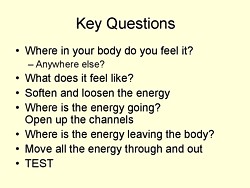
|
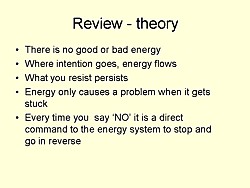
|

|
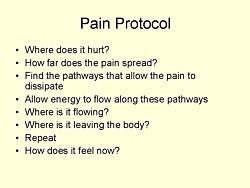
|
So it is pure vitalistic psycho-babble. The usual undefined use of impressive sounding words like “energy” and “quantum” with no defined meaning. Just preposterous made-up gobbledygook.
Before getting to EmoTrance, the course Psychotherapeutic Approaches in Naturopathy (3CMW606) had a lecture on Flower Essences. The evidence says, not surprisingly, that the effects of flower essences is not distinguishable from placebo “The hypothesis that flower remedies are associated with effects beyond a placebo response is not supported by data from rigorous clinical trials.” (See Ernst Wien. Klin. Wochenschr. 2002 114(23-24):963-6). Here are two of the slides.
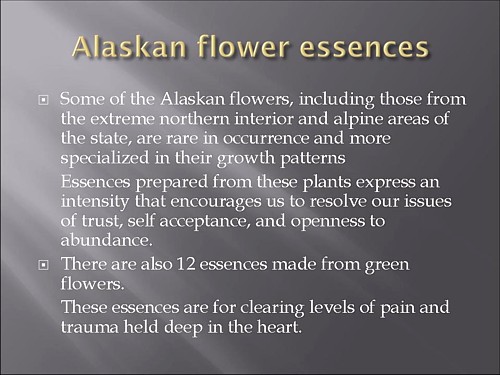
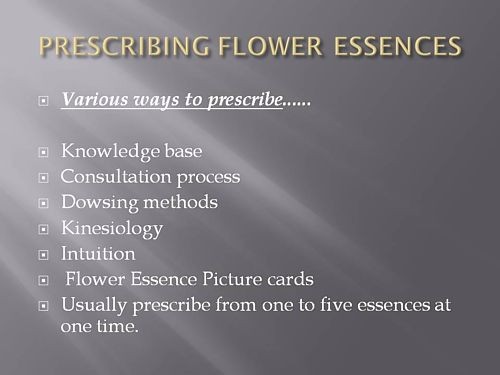
This last slide departs from the simply silly to the totally mad. Dowsing? Kinesiology?
Pendulums I’m told from more than one source that the use of pendulums is not uncommon. both in teaching and by students in the Westminster University polyclinic Apparently they provide an excellent way to choose a ‘remedy’ or make a diagnosis (well, I expect they are as good as the alternatives). If in doubt, guess.
Of course pendulums were popular with Cherie Blair who is reported to have taken her son Leo to a pendulum waver, Jack Temple, rather than have him vaccinated with MMR. At least her delusions affected fewer people than those of her husband (the latest Iraq body count is about 100,000).
Kinesiology was originally a word that applied to the perfectly sensible science of human movement. But Applied Kinesiology more often refers now to a fraudulent and totally ineffective diagnostic method invented by (you guessed) a chiropractor. It has been widely used by alternative medicine to misdiagnose food allergies. It does not work (Garrow, 1988: download reprint).
General Chiropractic Council It is a mind-boggling sign of the incompetence of the General Chiropractic Council that they manage to include kinesiology within their definition of “evidence based care”. Their definition is clearly sufficiently flexible to include anything whatsoever. The incompetence of the GCC is documented in superb detail on jdc325’s blog (James Cole).
Council for Healthcare Regulatory Excellence (CHRE) is yet another example of the network of ineffective and incompetent quangos that plague us.. It is meant to ensure that regulation is effective but utterly fails to do so. The CHRE is quoted as saying “[The GCC] takes its role seriously and aspires to, and often maintains, excellence.”. Like endorsing kinesiology and ‘craniosacral therapy’ perhaps? Quangos like the CHRE not only fail to ensure regulatory excellence, they actually endorse rubbish. They do more harm than good.
The reading list for the course includes the following books. I guess the vibrational medicine (whatever that means) was covered already in the now infamous ‘amethysts emit high yin energy‘ lectures.
Reading List
Essential:
Hartman S (2003) Oceans of Energy: The Patterns and Techniques of EmoTrance: Vol 1.DragonRising. ISBN: 1873483732.
Lynch V and Lynch P (2001) Emotional Healing in Minutes. Thorsons: London. ISBN: 0007112580Recommended:
Gerber R (2001) Vibrational Medicine for the 21st Century. Piatkus Publishers: London.
Gurudas (1989) Flower Essences and Vibrational Medicine. Cassandra Press: California, USA
Hartman S (2000) Adventures in EFT: The Essential Field Guide to Emotional Freedom Techniques. DragonRising. ISBN: 1873483635.
Hartman S (2004) Living Energy: The Patterns and Techniques of EmoTrance: Vol 2. DragonRising.ISBN: 1873483740.
Hartman S (2006) Energy Magic: The Patterns and Techniques of EmoTrance: Vol 3. Dragon Rising.ISBN: 1873483767.
Real magic.
Sylvia Hartman’s books seem to feature heavily in the reading list. I just got news of her latest effort
Welcome to a special update to the June 2009 newsletter to announce Silvia Hartmann’s latest book “Magic, Spells & Potions” is now available to pre-order from our site. The eBook edition will be released this Sunday, the most magical day of the year.
http://DragonRising.com/store/magic_spells_and_potions/?r=DR0609MSAP
If you do pre-order this exciting new book, not only will you be amongst the first to receive your copy, but you will also be entered into an exciting competition for Silvia Hartmann’s handmade copal amber magic pendant. Each paperback book pre-ordered will also be signed by the author and contain a unique blessing for the reader.
Because this is a serious book on real magic, potions and fortune telling if you are a beginner Silvia has provided ample sample spells and potions for you to practice working with before you start covering the advanced material.
What? No honestly, I didn’t invent that.
The idea that stuff of this sort is appropriate for a bachelor of science degree is simply ludicrous. I have no doubt that Westminster’s new dean can see that as well as anyone else. She has the delicate diplomatic job of extirpating the nonsense, I wish her well.
Follow-up
| The Prince of Wales’ Foundation for Integrated Health (FiH) is a propaganda organisation that aims to persuade people, and politicians, that the Prince’s somewhat bizarre views about alternative medicine should form the basis of government health policy.
His attempts are often successful, but they are regarded by many people as being clearly unconstitutional. |
 |
The FiH’s 2009 AnnualConferen ce conference was held at The King’s Fund, London 13 – 14 May 2009. It was, as always, an almost totally one-sided affair devoted to misrepresentation of evidence and the promotion of magic medicine. But according to the FiH, at least, it was a great success. The opening speech by the Quacktitioner Royal can be read here. It has already been analysed by somebody who knows rather more about medicine than HRH. He concludes
“It is a shocking perversion of the real issues driven by one man; unelected, unqualified and utterly misguided”.
We are promised some movie clips of the meeting. They might even make a nice UK equivalent of “Integrative baloney @ Yale“.
This post is intended to provide some background information about the speakers at the symposium. But let’s start with what seems to me to be the real problem. The duplicitous use of the word “integrated” to mean two quite different things.
The problem of euphemisms: spin and obfuscation
One of the problems of meetings like this is the harm done by use of euphemisms. After looking at the programme, it becomes obvious that there is a rather ingenious bit of PR trickery going on. It confuses (purposely?) the many different definitions of the word “integrative” . One definition of “Integrative medicine” is this (my emphasis).
” . . . orienting the health care process to engage patients and caregivers in the full range of physical, psychological, social, preventive, and therapeutic factors known to be effective and necessary for the achievement of optimal health.”
That is a thoroughly admirable aim. And that, I imagine, is the sense in which several of the speakers (Marmot, Chantler etc) used the term. Of course the definition is rather too vague to be very helpful in practice, but nobody would dream of objecting to it.
But another definition of the same term ‘integrative medicine’ is as a PR-friendly synonym for ‘alternative medicine’, and that is clearly the sense in which it is used by the Prince of Wales’ Foundation for Integrated Health (FIH), as is immediately obvious from their web site.
The guide to the main therapies supports everything from homeopathy to chiropractic to naturopathy, in a totally uncritical way. Integrated service refers explicitly to integration of ‘complementary’ medicine, and that itself is largely a euphemism for alternative medicine. For example, the FIH’s guide to homeopathy says
“What is homeopathy commonly used for?
Homeopathy is most often used to treat chronic conditions such as asthma; eczema; arthritis; fatigue disorders like ME; headache and migraine; menstrual and menopausal problems; irritable bowel syndrome; Crohn’s disease; allergies; repeated ear, nose, throat and chest infections or urine infections; depression and anxiety.”
But there is not a word about the evidence, and perhaps that isn’t surprising because the evidence that it works in any of these conditions is essentially zero.
The FIH document Complementary Health Care: A Guide for Patients appears to have vanished from the web after its inaccuracy received a very bad press, e.g. in the Times, and also here. It is also interesting that the equally widely criticised Smallwood report (also sponsored by the Prince of Wales) seems to have vanished too).
The programme for the meeting can be seen here, for Day 1, and Day 2
Conference chair Dr Phil Hammond, GP, comedian and health service writer. Hammond asked the FIH if I could speak at the meeting to provide a bit of balance. Guess what? They didn’t want balance.
09:30 Opening session
Dr Michael Dixon OBE
09:30 Introduction: a new direction for The Prince’s Foundation for Integrated Health and new opportunities in integrated health and care. Dr Michael Dixon, Medical Director, FIH
Michael Dixon is devoted to just about every form of alternative medicine. As well as being medical director of the Prince’s Foundation he also runs the NHS Alliance. Despite its name, the NHS Alliance is nothing to do with the NHS and acts, among other things, as an advocate of alternative medicine on the NHS, about which it has published a lot.
Dr Dixon is also a GP at College Surgery, Cullompton, Devon, where his “integrated practice” includes dozens of alternative practitioners. They include not only disproven things like homeopathy and acupuncture, but also even more bizarre practitioners in ‘Thought Field Therapy‘ and ‘Frequencies of Brilliance‘.
To take only one of these, ‘Frequencies of Brilliance’ is bizarre beyond belief. One need only quote its founder and chief salesperson.
“Frequencies of Brilliance is a unique energy healing technique that involves the activation of energetic doorways on both the front and back of the body.”
“These doorways are opened through a series of light touches. This activation introduces high-level Frequencies into the emotional and physical bodies. It works within all the cells and with the entire nervous system which activates new areas of the brain.”
“Frequencies of Brilliance is a 4th /5th dimensional work. The process is that of activating doorways by lightly touching the body or working just above the body.”
“Each doorway holds the highest aspect of the human being and is complete in itself. This means that there is a perfect potential to be accessed and activated throughout the doorways in the body.”
Best of all, it can all be done at a distance (that must help sales a lot). One is reminded of the Skills for Health “competence” in distant healing (inserted on a government web site at the behest (you guessed it) of the Prince’s Foundation, as related here)
“The intent of a long distance Frequencies of Brilliance (FOB) session is to enable a practitioner to facilitate a session in one geographical location while the client is in another.
A practitioner of FOB that has successfully completed a Stage 5 Frequency workshop has the ability to create and hold a stable energetic space in order to work with a person that is not physically present in the same room.
The space that is consciously created in the Frequencies of Brilliance work is known as the “Gap”. It is a space of nonlinear time. It contains ”no time and no space” or respectively “all time and all space”. Within this “Gap” a clear transfer of the energies takes place and is transmitted to an individual at a time and location consciously intended. Since this dimensional space is in non-linear time the work can be performed and sent backward or forward in time as well as to any location.
The Frequencies of Brilliance work cuts through the limitations of our physical existence and allows us to experience ourselves in other dimensional spaces. Therefore people living in other geographic locations than a practitioner have an opportunity to receive and experience the work.
The awareness of this dimensional space is spoken about in many indigenous traditions, meditation practices, and in the world of quantum physics. It is referred to by other names such as the void, or vacuum space, etc.”
This is, of course, preposterous gobbledygook. It, and other things in Dr Dixon’s treatment guide, seem to be very curious things to impose on patients in the 21st century.
Latest news. The Mid-Devon Star announces yet more homeopathy in Dr Dixon’s Cullompton practice. This time it comes in the form of a clinic run from the Bristol Homeopathic Hospital. I guess they must be suffering from reduced commissioning like all the other homeopathic hospitals, but Dr Dixon seems to have come to their rescue. The connection seems to be with Bristol’s homeopathic consultant, Dr Elizabeth A Thompson. On 11 December 2007 I wrote to Dr Thompson, thus
|
In March 2006, a press release http://www.ubht.nhs.uk/press/view.asp?257 announced a randomised trial for homeopathic treatment of asthma in children. This was reported also on the BBC http://news.bbc.co.uk/1/hi/england/bristol/4971050.stm . I’d be very grateful if you could let me know when results from this trial will become available. Yours sincerely David Colquhoun |
The reply, dated 11 December 2007, was unsympathetic
|
I have just submitted the funders report today and we have set ourselves the deadline to publish two inter-related papers by March 1st 2007. Can I ask why you are asking and what authority you have to gain this information. I shall expect a reply to my questions, |
I answered this question politely on the same day but nevertheless my innocent enquiry drew forth a rather vitriolic complaint from Dr Thompson to the Provost of UCL (dated 14 December 2007). In this case, the Provost came up trumps. On 14 January 2008 he replied to Thompson: “I have looked at the email that you copied to me, and I must say that it seems an entirely proper and reasonable request. It is not clear to me why Professor Colquhoun should require some special authority to make such direct enquiries”. Dr Thompson seems to be very sensitive. We have yet to see the results of her trial in which I’m still interested.
Not surprisingly, Dr Dixon has had some severe criticism for his views, not least from the UK’s foremost expert on the evidence for efficacy, Prof Edzard Ernst. Accounts of this can be found in Pulse,
and on Andrew Lewis’s blog.
Dixon is now (in)famous in the USA too. The excellent Yale neurologist, Steven Novella, has written an analysis of his views on Science Based Medicine. He describes Dr. Michael Dixon as “A Pyromaniac In a Field of (Integrative) Straw Men”
Peter Hain
09:40 Politics and people: can integrated health and care take centre stage in 2009/2010? Rt Hon Peter Hain MP
It seems that Peter Hain was converted to alternative medicine when his first baby, Sam, was born with eczema. After (though possibly not because of) homeopathic treatment and a change in diet, the eczema got better. This caused Hain, while Northern Ireland Secretary to spend £200,000 of taxpayers’ money to set up a totally uninformative customer satisfaction survey, which is being touted elsewhere in this meeting as though it were evidence (see below). I have written about this episode before: see Peter Hain and Get Well UK: pseudoscience and privatisation in Northern Ireland.
I find it very sad that a hero of my youth (for his work in the anti-apartheid movement) should have sunk to promoting junk science, and even sadder that he does so at my expense.
There has been a report on Hain’s contribution in Wales Online.
09:55 Why does the Health Service need a new perspective on health and healing? Sir Cyril Chantler, Chair, King’s Fund, previous Dean, Guy’s Hospital and Great Ormond Street
Cyril Chantler is a distinguished medical administrator. He also likes to talk and we have discussed the quackery problem several times. He kindly sent me the slides that he used. Slide 18 says that in order to do some good we “need to demonstrate that the treatment is clinically effective and cost effective for NHS use”. That’s impeccable, but throughout the rest of the slides he talks of integrating with complementary” therapies, the effectiveness of which is either already disproved or simply not known.
I remain utterly baffled by the reluctance of some quite sensible people to grasp the nettle of deciding what works. Chantler fails to grasp the nettle, as does the Department of Health. Until they do so, I don’t see how they can be taken seriously.
10.05 Panel discussion
The Awards
10:20 Integrated Health Awards 2009 Introduction: a review of the short-listed applications
10:45 Presentations to the Award winners by the special guest speaker
11:00 Keynote address by special guest speaker
Getting integrated
Dr David Peters
12:00 Integration, long term disease and creating a sustainable NHS. Professor David Peters, Clinical Director and Professor of Integrated Healthcare, University of Westminster
I first met David Peters after Nature ran my article, Science Degrees without the Science. .One of the many media follow-ups of that article was on Material World (BBC Radio 4). This excellent science programme, presented by Quentin Cooper, had a discussion between me and David Peters ( listen to the mp3 file).
There was helpful intervention from Michael Marmot who had talked, in the first half of the programme, about his longitudinal population studies.
Marmot stressed the need for proper testing. In the case of
homeopathy and acupuncture, that proper testing has largely been done. The tests were failed.
The University of Westminster has, of course, gained considerable notoriety as the university that runs more degree programmes in anti-scientific forms of medicine than any other. Their lecture on vibrational medicine teaches students that amethysts “emit high Yin energy so transmuting lower energies and clearing and aligning energy disturbances at all levels of being”. So far their vice-chancellor, Professor Geoffrey Petts, has declined to answer enquiries about whether he thinks such gobbledygook is appropriate for a BSc degree.
But he did set up an internal enquiry into the future of their alternative activities. Sadly that enquiry seems to have come to the nonsensical conclusion that the problem can be solved by injection of good science into the courses, as reported here and in the Guardian.
It seems obvious that if you inject good science into their BSc in homeopathy the subject will simply vanish in a puff of smoke.
In 2007, the University of Westminster did respond to earlier criticism in Times Higher Education, but their response seemed to me to serve only to dig themselves deeper into a hole.
Nevertheless, Westminster has now closed down its homeopathy degree (the last in the country to go) and there is intense internal discussion going on there. I have the impression that Dr Peters’ job is in danger. The revelation of more slides from their courses on homeopathy, naturopathy and Chinese herbal medicine shows that these courses are not only barmy, but also sometimes dangerous.
Professor Chris Fowler
12:10 Educating tomorrow’s integrated doctors. Professor Chris Fowler, Dean for Education, Barts and The London School of Medicine and Dentistry
I first came across Dr Fowler when I noticed him being praised for his teaching of alternative medicine to students at Barts and the London Medical School on the web site of the Prince’s Foundation. I wrote him a polite letter to ask if he really thought that the Prince of Wales was the right person to consult about the education of medical students. The response I got was, ahem, unsympathetic. But a little while later I noticed that two different Barts students had set up public blogs that criticised strongly the nonsense that was being inflicted on them.
At that point, I felt it was necessary to support the students who, it seemed to me, knew more about medical education than Professor Fowler. It didn’t take long to uncover the nonsense that was being inflicted on the students: read about it here.
There is a follow-up to this story here. Fortunately, Barts’ Director of Research, and, I’m told, the Warden of Barts, appear to agree with my view of the harm that this sort of thing can do to the reputation of Barts, so things may change soon,
Dame Donna Kinnair
12:30 Educating tomorrow’s integrated nurses.
Dame Donna Kinnair, Director of Nursing, Southwark PCT
As far as I can see, Donna Kinnair has no interest in alternative medicine. She is director of nursing at Southwark primary care trust and was an adviser to Lord Laming throughout his inquiry into the death of Victoria Climbié. I suspect that her interest is in integrating child care services (they need it, judging by the recent death of ‘Baby P’). Perhaps her presence shows the danger of using euphemisms like ‘integrated medicine’ when what you really mean is the introduction of unproven or disproved forms of medicine.
Michael Dooley
12:40 Integrating the care of women: an example of the new paradigm. Michael Dooley, Consultant Obstetrician and Gynecologist
DC’s rule 2. Never trust anyone who uses the word ‘paradigm’. It is a sure-fire sign of pseudoscience. In this case, the ‘new paradigm’ seems to be the introduction of disproven treatment. Dooley is a gynaecologist and Medical Director of the Poundbury Clinic. His clinic offers a whole range of unproven and disproved treatments. These include acupuncture as an aid to conception in IVF. This is not recommended by the Cochrane review, and one report suggests that it hinders conception rather than helps.
12.40 Discussion
13.00 – 14.00 Lunch and Exhibition
15.30 Tea
Boo Armstrong and Get Well UK
16.00 Integrated services in action: The Northern
Ireland experience: what has it shown us and what are its implications?
Boo Armstrong of Get Well UK with a team from the NI study
I expect that much will be made of this “study”, which, of course, tells you absolutely nothing whatsoever about the effectiveness of the alternative treatments that were used in it. This does not appear to be the view of Boo Armstrong, On the basis of the “study”, her company’s web site proclaims boldly
“Complementary Medicine Works
Get Well UK ran the first government-backed complementary therapy project in the UK, from February 2007 to February 2008″
This claim appears, prima facie, to breach the Unfair Trading Regulations of May 2008. The legality of the claim is, at the moment, being judged by a Trading Standards Officer. In any case, the “study” was not backed by the government as a whole, but just by Peter Hain’s office. It is not even clear that it had ethical approval.
The study consisted merely of asking people who had seen an alternative medicine practitioner whether they felt better or worse. There was no control group; no sort of comparison was made. It is surely obvious to the most naive person that a study like this cannot even tell you if the treatment has a placebo effect, never mind that it has any genuine effects of its own. To claim that it does so seems to be simply dishonest. There is no reason at all to think that the patients would not have got better anyway.
It is not only Get Well UK who misrepresent the evidence. The Prince’s
Foundation itself says
“Now a new, year long trial supported by the Northern Ireland health service has . . . demonstrated that integrating complementary and conventional medicine brings measurable benefits to patients’ health.”
That is simply not true. It is either dishonest or stupid. Don’t ask me which, I have no idea.
This study is no more informative than the infamous Spence (2005) ‘study’ of the same type, which seems to be the only thing that homeopaths can produce to support their case.
There is an excellent analysis of the Northern Ireland ‘study’ by Andy Lewis, The Northern Ireland NHS Alternative Medicine ‘Trial’. He explains patiently, yet again, what constitutes evidence and why studies like this are useless.
His analogy starts
” . . . the Apple Marketing Board approach the NHS and ask for £200,000 to do a study to show the truth behind the statement ‘An apple a day keeps the doctor away’. The Minister, being particularly fond of apples, agrees and the study begins.”
16.30 Social enterprise and whole systems integrated care. Dee Kyne, Sandwell PCT and a GP. Developing an integrated service in secondary care
Dee Kyne appears to be CEO of KeepmWell Ltd (a financial interest that is not mentioned).
Peter Mackereth, Clinical Lead, Supportive Services, Christie Hospital NHS Foundation Trust
I had some correspondence with Mackereth when the Times (7 Feb 2007) published a picture of the Prince of Wales inspecting an “anti-MRSA aromatherapy inhaler” in his department at the Christie. It turned out that the trial they were doing was not blind No result has been announced anyway, and on enquiry, I find that the trial has not even started yet. Surprising, then to find that the FIH is running the First Clinical Aromatherapy Conference at the Christie Hospital, What will there be to talk about?
Much of what they do at the Christie is straightforward massage, but they also promote the nonsensical principles of “reflexology” and acupuncture.
The former is untested. The latter is disproven.
Parallel Sessions
Developing a PCT funded musculoskeletal service Dr Roy Welford, Glastonbury Health Centre
Roy Welford is a Fellow of the Faculty of Homeopathy, and so promotes disproven therapies. The Glastonbury practice also advertises acupuncture (disproven), osteopathy and herbal medicine (largely untested so most of it consists of giving patients an unknown dose of an ill-defined drug, of unknown effectiveness and unknown safety).
Making the best of herbal self-prescription in integrated practice: key remedies and principles. Simon Mills, Project Lead: Integrated Self Care in Family Practice, Culm Valley Integrated Centre for Health, Devon
Simon Mills is a herbalist who now describes himself as a “phytotherapist” (it sounds posher, but the evidence, or lack of it, is not changed by the fancy name). Mills likes to say things like “there are herbs for heating and drying”, “hot and cold” remedies, and to use meaningless terms like “blood cleanser”, but he appears to be immune to the need for good evidence that herbs work before you give them to sick people. He says, at the end of a talk, “The hot and the cold remain the trade secret of traditional medicine”. And this is the 21st Century.
Practical ways in which complementary approaches can improve the treatment of cancer. Professor Jane Plant, Author of “Your life in your hands” and Chief Scientist, British Geological Society and Professor Karol Sikora, Medical Director, Cancer Partners UK
Jane Plant is a geologist who, through her own unfortunate encounter with breast cancer, became obsessed with the idea that a dairy-free diet cured her. Sadly there is no good evidence for that idea, according to the World Cancer Research Fund Report, led by Professor Sir Michael Marmot. No doubt her book on the subject sells well, but it could be held that it is irresponsible to hold out false hopes to desperate people. She is a supporter of the very dubious CancerActive organisation (also supported by Michael Dixon OBE –see above) as well as the notorious pill salesman, Patrick Holford (see also here).
Karol Sikora, formerly an oncologist at the Hammersmith Hospital, is now Dean of Medicine at the University of Buckingham (the UK’s only private university). He is also medical director at CancerPartners UK, a private cancer company.
He recently shot to fame when he appeared in a commercial in the USA sponsored by “Conservatives for Patients’ Rights”, to pour scorn on the NHS, and to act as an advocate for the USA’s present health system. A very curious performance. Very curious indeed.
His attitude to quackery is a mystery wrapped in an enigma. One was somewhat alarmed to see him sponsoring a course at what was, at first, called the British College of Integrated Medicine, and has now been renamed the Faculty of Integrated Medicine That grand title makes it sound like part of a university. It isn’t.
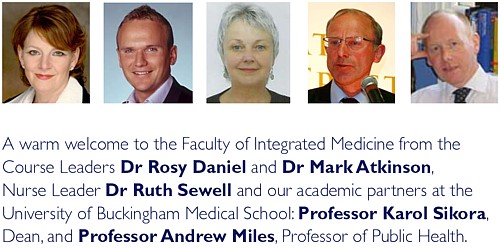
The alarm was as result of the alliance with Dr Rosy Daniel (who promotes an untested herbal conconction, Carctol, for ‘healing’ cancer) and Dr Mark Atkinson (a supplement salesman who has also promoted the Qlink pendant. The Qlink pendant is a simple and obvious fraud designed to exploit paranoia about WiFi killing you.
The first list of speakers on the proposed diploma in Integrated Medicine was an unholy alliance of outright quacks and commercial interests. It turned out that, although Karol Sikora is sponsoring the course, he knew nothing about the speakers. I did and when I pointed this out to Terence Kealey, vice-chancellor of Buckingham, he immediately removed Rosy Daniel from directing the Diploma. At the moment the course is being revamped entirely by Andrew Miles. There is hope that he’ll do a better job. It has not yet been validated by the University of Buckingham. Watch this space for developments.
Stop press It is reported in the Guardian that Professor Sikora has been describing his previous job at Imperial College with less than perfect accuracy. Oh dear. More developments in the follow-up.
The role of happy chickens in healing: farms as producers of health as well as food – the Care Farm Initiative Jonathan Dover, Project Manager, Care Farming, West Midlands.
“Care farming is a partnership between farmers, participants and health & social care providers. It combines the care of the land with the care of people, reconnecting people with nature and their communities.”
Sounds lovely, I wonder how well it works?
What can the Brits learn from the Yanks when it comes to integrated health? Jack Lord, Chief Executive Humana Europe
It is worth noticing that the advisory board of Humana Europe includes Micheal Dixon OBE, a well known advocate of alternative medicine (see
above). Humana Europe is a private company, a wholly owned subsidiary of Humana Inc., a health benefits company with 11 million members and 22,000 employees and headquarters in Louisville, Kentucky. In 2005 it entered into a business partnership with Virgin Group. Humana was mentioned in the BBC Panorama programme “NHS for Sale”. The company later asked that it be pointed out that they provide commissioning services, not clinical services [Ed. well not yet anyway].
Humana’s document “Humana uses computer games to help people lead healthier lives” is decidedly bizarre. Hang on, it was only a moment ago that we were being told that computer games rewired your brain.
Day 2 Integrated health in action
09.00 Health, epidemics and the search for new solutions. Sir Michael Marmot, Professor of Epidemiology and Public Health, Royal Free and University College Medical School
It is a mystery to me that a distinguished epidemiologist should be willing to keep such dubious company. Sadly I don’t know what he said, but judging my his publications and his appearence on Natural World, I can’t imagine he’d have much time for homeopaths.
9.25 Improving health in the workplace. Dame Carol Black, National Director, Health and Work, Department of Health
This is not the first time that Dame Carol has been comtroversial.
9.45 Integrated health in focus: defeating obesity. Professor Chris Drinkwater, President, NHS Alliance.
The NHS Alliance was mentioned above. Enough said.
10.00 Integrated healthcare in focus: new approaches to managing asthma, eczema and allergy. Professor Stephen Holgate, Professor of Immunopharmacology, University of Southampton
10.15 Using the natural environment to increase activity. The Natural England Project: the results from year one. Dr William Bird and Ruth Tucker, Natural England.
10.30 Panel discussion
10.45 Coffee
Self help in action
11.10 Your health, your way: supporting self care through care planning and the use of personal budgets. Angela Hawley, Self Care Lead, Department of Health
11.25 NHS Life Check: providing the signposts to
integrated health. Roy Lambley, Project Director, NHS LifeCheck Programme
This programme was developed with the University of Westminster’s “Health and Well-being Network”. This group, with one exception, is separate from Westminster’s extensive alternative medicine branch (it’s mostly psychologists).
11.45 The agony and the ecstasy of helping patients to help themselves: tips for clinicians, practices and PCTs. Professor
Ruth Chambers, FIH Foundation Fellow.
11.55 Providing self help in practice: Department of Health Integrated Self Help Information Project. Simon Mills, Project Lead: Integrated Self Care in Family Practice, Culm Valley Integrated Centre for Health, Devon and Dr Sam Everington, GP, Bromley by Bow.
The Culm Valley Integrated Centre for health is part of the College Surgery Partnership, associated with Michael Dixon OBE (yes, again!).
Simon Mills is the herbalist who says “The hot and the cold remain the trade secret of traditional medicine” .
Sam Everington, in contrast, seems to be interested in ‘integration’ in the real sense of the word, rather than quackery.
Integrated health in action
How to make sense of the evidence on complementary approaches: what works? What might work? What doesn’t work?
Dr Hugh MacPherson, Senior Research Fellow in Health Sciences, York University and Dr Catherine Zollman, Bravewell Fellow
Hugh MacPherson‘s main interest is in acupuncture and he publishes in alternative medicine journals. Since the recent analysis in the BMJ from the Nordic Cochrane Centre (Madsen et al., 2009) it seems that acupuncture is finally dead. Even its placebo effect is too small to be useful. Catherine Zollman is a Bristol GP who is into homeopathy as well as acupuncture. She is closely connected with the Prince’s Foundation via the Bravewell Fellowship. That fellowship is funded by the Bravewell Collaboration, which is run by Christie Mack, wife of John Mack (‘Mack the Knife’), head of Morgan Stanley (amazingly, they still seem to have money). This is the group which, by sheer wealth, has persuaded so many otherwise respectable US universities to embrace every sort of quackery (see, for example, Integrative baloney @ Yale)
The funding of integrated services
14.15 How to get a PCT or practice- based commissioner to fund your integrated service. A PCT Chief Executive and a Practice-Based Commissioning lead.
14.30 How I succeeded: funding an integrated service. Dr John Ribchester, Whitstable
14.45 How we created an acupuncture service in St Albans and Harpenden PBC group. Mo Girach, Chief Executive, STAHCOM
Uhuh Acupunture again. Have these people never read Bausell’s
book? Have they not read the BMJ? Acupuncture is now ell-established to be based on fraudulent principles, and not even to have a worthwhile placeobo effect. STAHCOM seem to be more interested in money than in what works.
Dragon’s Den. Four pitchers lay out their stall for the commissioning dragons
And at this stage there is no prize for guessing that all four are devoted to trying to get funds for discredited treatments
- An acupuncture service for long-term pain. Mike Cummings Chair, Medical Acupuncture Association
- Manipulation for the treatment of back pain Simon Fielding, Founder Chairman of the General Osteopathic Council
- Nigel Clarke, Senior Partner, Learned Lion Partners Homeopathy for long term conditions
- Peter Fisher, Director, Royal Homeopathic Hospital
Sadly it is not stated who the dragons are. One hopes they will be more interested in evidence than the supplicants.
Mike Cummings at least doesn’t believe the nonsense about meridians and Qi. It’s a pity he doesn’t look at the real evidence though.
You can read something about him and his journal at BMJ Group promotes acupuncture: pure greed.
Osteopathy sounds a bit more respectable than the others, but in fact it has never shaken off its cult-like origins. Still many osteopaths make absurd claims to cure all sorts of diseases. Offshoots of osteopathy like ‘cranial osteopathy’ are obvious nonsense. There is no reason to think that osteopathy is any better than any other manipulative therapy and it is clear that all manipulative therapies should be grouped into one.
Osteopathy and chiropractic provide the best ever examples of the folly of giving official government recognition to a branch of alternative medicine before the evidence is in.
Learned Lion Partners is a new one on me. It seems it is
part of Madsen Gornall Ashe Chambers (‘MGA Chambers’) “a grouping of top level, independent specialists who provide a broad range of management consultancy advice to the marketing community”. It’s a management consultant and marketing outfit. So don’t expect too much when it comes to truth and evidence. The company web site says nothing about alternative medicine, but only that Nigel Clarke
“. . . has very wide experience of public affairs issues and campaigns, having worked with clients in many sectors in Europe, North America and the Far East. He has particular expertise in financial, competition and healthcare issues. “
However, all is revealed when we see that he is a Trustee of the Prince’s Foundation where his entry says
“Nigel Clarke is senior partner of Learned Lion Partners. He is a director of Vidapulse Ltd, Really Easy Ltd, Newscounter Ltd and Advanced Transport Systems Ltd. He has worked on the interfaces of public policy for 25 years. He has been chair of the General Osteopathic Council since May 2001, having been a lay member since it was formed. He is now a member of the Council for Healthcare Regulatory Excellence”
The Council for Healthcare Regulatory Excellence is yet another quango that ticks boxes and fails absolutely to grasp the one important point, does it work?. I came across them at the Westminster Forum, and they seemed a pretty pathetic way to spend £2m per year.
Peter Fisher is the last supplicant to the Dragons. He is clinical director of the Royal London Homeopathic Hospital (RLHH), and Queen’s homeopathic physician, It was through him that I got an active interest in quackery. The TV programme QED asked me to check the statistics in a paper of his that claimed that homeopathy was good for fibrositis (there was an elementary mistake and no evidence for an effect). Peter Fisher is also remarkable because he agreed with me that BSc degrees in homeopathy were not justified (on TV –see the movie). And he condemned homeopaths who were caught out recommending their sugar pills for malaria. To that extent Fisher represents the saner end of the homeopathic spectrum. Nevertheless he still maintains that sugar pills work and have effects of their own, and tries to justify the ‘memory of water’ by making analogies with a memory stick or CD. This is so obviously silly that no more comment is needed.
Given Fisher’s sensible condemnation of the malaria fiasco, I was rather surprised to see that he appeared on the programme of a conference at the University of Middlesex, talking about “A Strategy To Research The Potential Of Homeopathy In Pandemic Flu”. The title of the conference was Developing Research Strategies in CAM. A colleague, after seeing the programme, thought it was more like “a right tossers’ ball”.
Much of the homeopathy has now vanished from the RLHH as a result of greatly reduced commissioning by PCTs (read about it in Fisher’s own words). And the last homeopathy degree in the UK has closed down. It seems an odd moment for the FIH to be pushing it so hard.
Follow-up
Stop press It is reported in the Guardian (22 May 2009) that Professor Sikora has been describing his previous job at Imperial College with less than perfect accuracy. Oh dear, oh dear.
This fascinating fact seems to have been unearthed first by the admirable NHS Blog Doctor, in his post ‘Imperial College confirm that Karol Sikora does not work for them and does not speak on their behalf‘.
The Nutrition Society is the interim professional body for nutrition. It seems that, unlike so many ‘regulatory bodies’, it may actually take its responsibilities seriously. The following announcement has appeared on their web site.
|
The UK Voluntary Register of Nutritionists acts to protect the public and the reputation the nutrition profession On March 4th 2009, a Fitness to Practice Panel was convened to consider an allegation against a registrant, Dr Ann Walker, that her fitness to practise was impaired. The panel considered whether the registrant, in advocating the use of a web based personal nutritional profiling service had complied with the Code of Ethics’ clause 3: This expects all registered nutritionists to “maintain the highest standards of professionalism and scientific integrity”. In particular, the panel considered whether the registrant showed “knowledge, skills and performance of high quality, up-to-date, and relevant to their field of practice”, in keeping with the Statement of Professional Conduct (para 9). The Panel accepted the allegation of impaired fitness to practice. Mindful of its duty to protect the public, it recommended that Dr Walker be removed from the register. Dr Walker has a right of appeal. |
Well. well, this must be none other than the Dr Ann Walker who caused UCL,and me, such trouble a few years ago. And just because I described her use of the word “blood cleanser” as gobbledygook. She has appeared a few times on this blog.
- Nutribollocks: antioxidants useless, some are dangerous
- Red clover, herbal spin and vested interests
- The fallout from DC’s de-excommunication
- So what is a “blood cleanser”? Quinion speaks.
- Herbal medicines fail test
- Nutriprofile: useful aid or sales scam?
- She even gets a brief mention at Boots reaches new level of dishonesty with CoQ10 promotion

Presumably the “web-based personal nutritional profiling service” that is referred to is Nutriprofile, on which, with the help of a dietition, we had a bit of fun a while ago. However ideal your diet it still recommended at the end of the questionnaire that you should buy some expensive supplements. Read about it at Nutriprofile: useful aid or sales scam?
I have no idea who lodged the complaint (but it wasn’t me).
It is interesting to compare the high standards of the Nutrition Society with the quite different standards of BANT (the British Association for Applied Nutrition and Nutritional Therapy). They bill themselves as the “Professional Body for Nutritional Therapists”. Nutritional therapists are those fantasists who believe you can cure any ill by buying some supplement pills. Their standards can be judged by, for example, BANT ethics code: BANT nutritional therapists are allowed to earn commission from selling pills and tests.
It seems Dr Ann Walker may have joined the wrong society.
Follow-up
Notice
I heard, in January 2011, that Barts has a new Dean of Education, and no longer teaches about alternative medicine in the way that has caused so much criticism in the last two years. That’s good news.
What on earth has gone wrong at the Barts and The London School of Medicine and Dentistry (SMD)?

It is not so long ago that I discovered that the very sensible medical students at Barts were protesting vigourously about being forced to mix with various quacks. A bit of investigation soon showed that the students were dead right: see St Bartholomew’s teaches antiscience, but students revolt.
Now it seems that these excellent students have not yet succeeded in educating their own Dr Mark Carroll who, ironically, has the title Associate Dean (Education Quality) in the Centre for Medical Education (SMD), specialising in all aspects of quality assurance in the SMD,
Recently this letter was sent to all medical students. They are so indignant at the way they are being treated, it didn’t take long for a copy of the letter to reach me via a plain brown email.
| Does any medical student have a particular interest in Complementary Medicine? If so, a group at Westminster University would like to contact you (see email message below) with a view to some collaborative work. Further details from Dr Mark Carroll ( m.carroll@qmul.ac.uk ).
|
A student of naturopathy? Does Mark Carroll have the slightest idea what naturopathy is (or pretends to be)? If so, why is he promoting it? If not, he clearly hasn’t done his homework.
You can get a taste of naturopathy in Another worthless validation: the University of Wales and nutritional therapy, or in Nutritional Fairy Tales from Thames Valley University.
It is a branch of quackery that is so barmy that it’s actually banned in some US states. A pharmacist was fined $1 miilion for practising it. But Barts encourages it.
Or read here about the College of Natural Nutrition: bizarre teaching revealed. They claim to cure thyroid cancer with castor oil compresses, and a holder of their diploma was fined £800 000 for causing brain damage to a patient.
I removed the name of the hapless naturopathy student, I have no wish for her to get abusive mail. It isn’t her fault that she has been misled by people who should know better. If you feel angry about this sort of thing then that should be directed to the people who mislead them. The poor student has been misled in to taking courses that teach amethysts emit high yin energy by the University of Westminster’s Vice-chancellor, Professor Geoffrey Petts, But note that Professor Petts has recently set up a review of the teaching of what he must know to be nonsense (though it hasn’t got far yet). In contrast, Dr Carroll appears to be quite unrepentant. He is the person you to whom you should write if you feel indignant.
He claims Barts is "ahead of the game". Which game? Apparently the game of leading medicine back to the dark ages and the High Street quack shop. But, Dr Carroll, it isn’t a game. Sick people are involved.
Dr Carroll is the Associate Dean (Education Quality) in the Centre for Medical Education (SMD), specialising in all aspects of quality assurance in the SMD. This has to be the ultimate irony. It’s true that the Prince of Wales approach to medicine has penetrated slightly into other, otherwise good, medical schools (for example, Edinburgh) but I’m not aware of any other that has gone so far down the road of irrationality as at Barts.
Dr Carroll, I suggest you listen to your students a bit more closely.
You might also listen to President Obama. He has just allocated $1.1 billion “to compare drugs, medical devices, surgery and other ways of treating specific conditions“. This has infuriated the drug industry and far-right talk show host Rush Limbaugh. Doubtless it will infuriate quacks too, if any of it is spent on testing their treatments properly.
Follow-up
This letter appeared in the Times on Friday 30 January, 2009. It was prompted by the news from the University of Salford, but its main purpose was to try to point out to the Department of Health that you can’t hope to regulate alternative treatments in any sensible way while continuing to push under the carpet the crucial question of which ones work and which don’t.
| Sir
We would like to congratulate the vice-chancellor of the University of Salford, Professor Michael Harloe for his principled decision to drop “all the University’s programmes associated with complementary medicine within the School of Community, Health Sciences & Social Care”. This includes their “Homeopathy in Practice” degree. It is also encouraging that the University of Central Lancashire recently closed its BSc in Homeopathy to new students, and announced a review of all its activities in alternative medicine. Although universities are now taking sensible actions, government policy in the area of regulation of alternative medicine is in urgent need of revision. In May 2008 the Steering Group chaired by Professor Pittilo recommended to the Department of Health that entry into acupuncture, herbal medicine and traditional Chinese medicine should “normally be through a bachelor degree with honours”. But, in the same month, new regulations on Unfair Trading came into effect. One of the 31 commercial practices which are in all circumstances considered unfair is “falsely claiming that a product is able to cure illnesses, dysfunction or malformations”. One part of government seeks to endorse unproven and disproved treatments, at the same time as another part makes them illegal. The reason for this chaotic situation is simple. The Department of Health, and the Medicines and Healthcare products Regulatory Agency (MHRA), have consistently failed to grasp the nettle of deciding which treatments work and which don’t. That is the first thing you want to know about any treatment. Vice-chancellors seem now to be asking the question, and the government should do so too. The ideal mechanism already exists. The question should be referred to the National Institute for Health and Clinical Excellence (NICE). That was recommended by a House of Lords report in 2000, and it was recommended again by the Smallwood report (commissioned by the Prince of Wales) in 2005. Now it should be done. Sir Walter Bodmer FRCPath, FRS, FMedSci, FRCP (hon) FRCS(hon) Professor David Colquhoun, FRS Dame Bridget Ogilvie , AC, DBE, FRS, FAA, Professor Dame Nancy Rothwell, FRS, FMedSci, FRCP (hon) |
(Actually, the Times removed the qualifications of the signatories, but left the titles!)
An earlier, longer, version of the letter tried to preempt the obvious criticism by including, as the second paragraph, this passage.
“It makes no sense to offer Bachelor of Science degrees in subjects that have no scientific basis. Not only is homeopathy scientifically absurd, but also the best quality clinical trials show that it is not distinguishable from placebo. From the point of view of the patient, there is nothing wrong with placebo effects. Conventional drugs benefit from them too. There is everything wrong with surrounding the placebo effect with mystical mumbo-jumbo and awarding degrees in it.”
Universities drop degree courses in alternative medicine
In the same issue, there was a related article by the Times’ education editor, Alexandra Frean: Universities drop degree courses in alternative medicine..
“Universities are increasingly turning their backs on homoeopathy and complementary medicine amid opposition from the scientific community to “pseudo-science” degrees.
The University of Salford has stopped offering undergraduate degrees in the subjects, and the University of Westminster announced yesterday that it plans to strengthen the “science base” content of its courses after an internal review which examined their scientific credibility.
Both universities are following the lead of the University of Central Lancashire, which last year stopped recruiting new students to its undergraduate degree in homoeopathic medicine.
The decisions by Salford and Westminster open a new chapter in the fierce debate about the place of awarding of Bachelor of Science degrees in subjects that are not science.”
The article ends thus.
“Other universities are more robust in their defence of their courses
Ian Appleyard, principal lecturer in acupuncture at London South Bank University, said that acupuncture should be studied for the very reason that it was not well understood from the standpoint of Western scientific medicine. Acupuncture had been used by a significant proportion of the world’s population for thousands of years.
“Recent large-scale clinical trials such Haake and meta-analysis from reputable institutions such as The Cochrane Collaboration, have shown that there is evidence to support the therapeutic benefits of acupuncture treatment for back pain and migraine,” he said.”
Uhuh, it seems that Ian Appleyard has been reading the misleading BBC report on the recent trials. In fact they show precisely the opposite of what he claims. The fact that advocates of alternative medicine can misinterpret the evidence so badly is, I guess, at the heart of the problem.
What’s happening at the University of Westminster?
Westminster has regularly been labelled as the University that has more quackery courses than any other.
It is also the only university for which we have much idea about what is taught. The university, like all others, has tried to keep secret what they teach. That itself shows that they aren’t very proud of it. But a surprising amount has leaked out from Westminster, nonetheless. The set of “vibrational medicine” slides, including “Amethysts emit high Yin energy”, have caused much hilarity. The Westminster “miasmatic” examination question gets some laughs too, after it was published in Nature. The set of homeopathic materia medica notes that have come into my possession are pretty good too (coming on line soon).
Recently it emerged that the University of Westminster had followed the example of the University of Central Lancashire (UCLAN), and set up a review of its activities in alternative medicine. But unlike UCLAN it was kept secret, and as far as one can tell, it asked for no input from critics.
Well the outcome of this review turned up in my mail recently. Click the picture to read the whole letter from the Vice-Chancellor.
There is no doubt that the outcome, so far, is rather disappointing. Here are some quotations from this letter, with my comments interleaved.
“The Audit was Chaired by Professor Alan Jago and carried out its review using a comprehensive evidence base”
Alan Jago is a pro- vice chancellor, and formerly from Westminster’s School of Architecture and the Built Environment, so no specialist knowledge there.
“The panel made a number of recommendations to me as a result of their Audit. Many of these recommendations concern the University’s processes for review and validation of courses and these will be passed to the Pro Vice Chancellor responsible for Quality to consider.”
Uhuh, sounds like box-ticking again When will universities learn that validation procedures are, on the whole, not worth the paper they are written on.
“The overarching aim of these actions then is to strengthen and make more explicit the ‘scientific’ nature of the Integrated Health undergraduate degrees.
In order to do this we will:
Strengthen learning outcomes particularly in discipline and clinical modules to reflect the science outcomes embedded in the courses.
Revise course specific regulations to explicitly identify that the core health sciences modules have to be passed to complete a degree of the BSc Scheme.
Strengthen the final year project offer to provide more scientific projects through working with Biosciences staff.
Strengthen the scientific/academic qualifications of staff through development
of existing staff and appointments where they become available.”
This seems to me to be whistling in the wind. Remember, we are talking about “bachelor of science” degrees in things like homeopathy and naturotherapy. These are things that are not science at all. In fact they are antiscience to their core.
If you were successful in raising the increasing the scientific level of the staff, many of the subjects they are meant to be teaching would vanish in a puff of smoke.
Certainly the responses of the Westminster staff to earlier enquiries (here, and here) showed little sign of scientific thinking.
And I wonder what Westminster’s admirable biomedical scientists think about taking on homeopathy students for projects?
“I am certain that this work will place Complementary therapies courses in an extremely strong position to meet the external challenges of the future.
I’m sorry to say, Professor Petts, that the scientific community is not likely to share your certainty.
Remember, Peter Fisher is on record as saying that there is not enough science in homeopathy to justifiy offering a BSc degree in it (watch the movie). He is the Queen’s Homeopathic Physician, and Clinical Director of the Royal London Homeopathic Hospital But Westminster still seems to know better.
It seems, so far, that Westminster has missed a chance to change for the better.
Follow-up
Times Higher Education published a pretty pathetic report on the Westminster audit. They did ask me for comments but then failed to publish most of them. I suppose a magazine like that is so dependent on advertising that they can’t afford to upset the authorities. Nevertheless, do they really have to be quite so bland?
I hear that the internal audit has made everyone at the University of Woominster Westminster more nervous and that staff and students have been advised not to share teaching material with people outside the university. Having seen some of them, I’m not surprised they are ashamed of them.
I’m perfectly happy to think of alternative medicine as being a voluntary, self-imposed tax on the gullible (to paraphrase Goldacre again). But only as long as its practitioners do no harm and only as long as they obey the law of the land. Only too often, though, they do neither.
When I talk about law, I don’t mean lawsuits for defamation. Defamation suits are what homeopaths and chiropractors like to use to silence critics. heaven knows, I’ve becomes accustomed to being defamed by people who are, in my view. fraudsters, but lawsuits are not the way to deal with it.
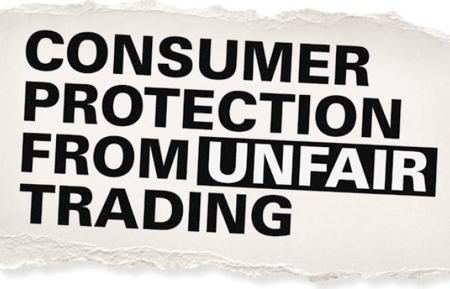
I’m talking about the Trading Standards laws Everyone has to obey them, and in May 2008 the law changed in a way that puts the whole health fraud industry in jeopardy.
The gist of the matter is that it is now illegal to claim that a product will benefit your health if you can’t produce evidence to justify the claim.
I’m not a lawyer, but with the help of two lawyers and a trading standards officer I’ve attempted a summary. The machinery for enforcing the law does not yet work well, but when it does, there should be some very interesting cases.
The obvious targets are homeopaths who claim to cure malaria and AIDS, and traditional Chinese Medicine people who claim to cure cancer.
But there are some less obvious targets for prosecution too. Here is a selection of possibilities to savour..
- Universities such as Westminster, Central Lancashire and the rest, which promote the spreading of false health claims
- Hospitals, like the Royal London Homeopathic Hospital, that treat patients with mistletoe and marigold paste. Can they produce any real evidence that they work?
- Edexcel, which sets examinations in alternative medicine (and charges for them)
- Ofsted and the QCA which validate these exams
- Skills for Health and a whole maze of other unelected and unaccountable quangos which offer “national occupational standards” in everything from distant healing to hot stone therapy, thereby giving official sanction to all manner of treatments for which no plausible evidence can be offered.
- The Prince of Wales Foundation for Integrated Health, which notoriously offers health advice for which it cannot produce good evidence
- Perhaps even the Department of Health itself, which notoriously referred to “psychic surgery” as a profession, and which has consistently refused to refer dubious therapies to NICE for assessment.
The law, insofar as I’ve understood it, is probably such that only the first three or four of these have sufficient commercial elements for there to be any chance of a successful prosecution. That is something that will eventually have to be argued in court.
But lecanardnoir points out in his comment below that The Prince of Wales is intending to sell herbal concoctions, so perhaps he could end up in court too.
The laws
We are talking about The Consumer Protection from Unfair Trading Regulations 2008. The regulations came into force on 26 May 2008. The full regulations can be seen here, or download pdf file. They can be seen also on the UK Statute Law Database.
The Office of Fair Trading, and Department for Business, Enterprise & Regulatory Reform (BERR) published Guidance on the Consumer Protection from Unfair Trading Regulations 2008 (pdf file),
Statement of consumer protection enforcement principles (pdf file), and
The Consumer Protection from Unfair Trading Regulations: a basic guide for business (pdf file).
Has The UK Quietly Outlawed “Alternative” Medicine?
On 26 September 2008, Mondaq Business Briefing published this article by a Glasgow lawyer, Douglas McLachlan. (Oddly enough, this article was reproduced on the National Center for Homeopathy web site.)
“Proponents of the myriad of forms of alternative medicine argue that it is in some way “outside science” or that “science doesn’t understand why it works”. Critical thinking scientists disagree. The best available scientific data shows that alternative medicine simply doesn’t work, they say: studies repeatedly show that the effect of some of these alternative medical therapies is indistinguishable from the well documented, but very strange “placebo effect” ”
“Enter The Consumer Protection from Unfair Trading Regulations 2008(the “Regulations”). The Regulations came into force on 26 May 2008 to surprisingly little fanfare, despite the fact they represent the most extensive modernisation and simplification of the consumer protection framework for 20 years.”
The Regulations prohibit unfair commercial practices between traders and consumers through five prohibitions:-
- General Prohibition on Unfair Commercial
Practices (Regulation 3)- Prohibition on Misleading Actions (Regulations 5)
- Prohibition on Misleading Omissions (Regulation 6)
- Prohibition on Aggressive Commercial Practices (Regulation 7)
- Prohibition on 31 Specific Commercial Practices that are in all Circumstances Unfair (Schedule 1). One of the 31 commercial practices which are in all circumstances considered unfair is “falsely claiming that a product is able to cure illnesses, dysfunction or malformations”. The definition of “product” in the Regulations includes services, so it does appear that all forms medical products and treatments will be covered.
Just look at that!
| One of the 31 commercial practices which are in all circumstances considered unfair is “falsely claiming that a product is able to cure illnesses, dysfunction or malformations” |
Section 5 is equally powerful, and also does not contain the contentious word “cure” (see note below)
Misleading actions
5.—(1) A commercial practice is a misleading action if it satisfies the conditions in either paragraph (2) or paragraph (3).
(2) A commercial practice satisfies the conditions of this paragraph—
(a) if it contains false information and is therefore untruthful in relation to any of the matters in paragraph (4) or if it or its overall presentation in any way deceives or is likely to deceive the average consumer in relation to any of the matters in that paragraph, even if the information is factually correct; and
(b) it causes or is likely to cause the average consumer to take a transactional decision he would not have taken otherwise.
These laws are very powerful in principle, But there are two complications in practice.
One complication concerns the extent to which the onus has been moved on to the seller to prove the claims are true, rather than the accuser having to prove they are false. That is a lot more favourable to the accuser than before, but it’s complicated.
The other complication concerns enforcement of the new laws, and at the moment that is bad.
Who has to prove what?
That is still not entirely clear. McLachlan says
“If we accept that mainstream evidence based medicine is in some way accepted by mainstream science, and alternative medicine bears the “alternative” qualifier simply because it is not supported by mainstream science, then where does that leave a trader who seeks to refute any allegation that his claim is false?
Of course it is always open to the trader to show that his the alternative therapy actually works, but the weight of scientific evidence is likely to be against him.”
On the other hand, I’m advised by a Trading Standards Officer that “He doesn’t have to refute anything! The prosecution have to prove the claims are false”. This has been confirmed by another Trading Standards Officer who said
“It is not clear (though it seems to be) what difference is implied between “cure” and “treat”, or what evidence is required to demonstrate that such a cure is false “beyond reasonable doubt” in court. The regulations do not provide that the maker of claims must show that the claims are true, or set a standard indicating how such a proof may be shown.”
The main defence against prosecution seems to be the “Due diligence defence”, in paragraph 17.
Due diligence defence
17. —(1) In any proceedings against a person for an offence under regulation 9, 10, 11 or 12 it is a defence for that person to prove—
(a) that the commission of the offence was due to—
(i) a mistake;
(ii) reliance on information supplied to him by another person;
(iii) the act or default of another person;
(iv) an accident; or
(v) another cause beyond his control; and
(b) that he took all reasonable precautions and exercised all due diligence to avoid the commission of such an offence by himself or any person under his control.
If “taking all reasonable precautions” includes being aware of the lack of any good evidence that what you are selling is effective, then this defence should not be much use for most quacks.
Douglas McLachlan has clarified, below, this difficult question
False claims for health benefits of foods
A separate bit of legislation, European regulation on nutrition and health claims made on food, ref 1924/2006, in Article 6, seems clearer in specifying that the seller has to prove any claims they make.
Article 6
Scientific substantiation for claims
1. Nutrition and health claims shall be based on and substantiated by generally accepted scientific evidence.
2. A food business operator making a nutrition or health claim shall justify the use of the claim.
3. The competent authorities of the Member States may request a food business operator or a person placing a product on the market to produce all relevant elements and data establishing compliance with this Regulation.
That clearly places the onus on the seller to provide evidence for claims that are made, rather than the complainant having to ‘prove’ that the claims are false.
On the problem of “health foods” the two bits of legislation seem to overlap. Both have been discussed in “Trading regulations and health foods“, an editorial in the BMJ by M. E. J. Lean (Professor of Human Nutrition in Glasgow).
“It is already illegal under food labelling regulations (1996) to claim that food products can treat or prevent disease. However, huge numbers of such claims are still made, particularly for obesity ”
“The new regulations provide good legislation to protect vulnerable consumers from misleading “health food” claims. They now need to be enforced proactively to help direct doctors and consumers towards safe, cost effective, and evidence based management of diseases.”
In fact the European Food Standards Agency (EFSA) seems to be doing a rather good job at imposing the rules. This, predictably, provoked howls of anguish from the food industry There is a synopsis here.
“Of eight assessed claims, EFSA’s Panel on Dietetic Products, Nutrition and Allergies (NDA) rejected seven for failing to demonstrate causality between consumption of specific nutrients or foods and intended health benefits. EFSA has subsequently issued opinions on about 30 claims with seven drawing positive opinions.”
“. . . EFSA in disgust threw out 120 dossiers supposedly in support of nutrients seeking addition to the FSD’s positive list.
If EFSA was bewildered by the lack of data in the dossiers, it needn’t hav been as industry freely admitted it had in many cases submitted such hollow documents to temporarily keep nutrients on-market.”
Or, on another industry site, “EFSA’s harsh health claim regime”
“By setting an unworkably high standard for claims substantiation, EFSA is threatening R&D not to mention health claims that have long been officially approved in many jurisdictions.”
Here, of course,”unworkably high standard” just means real genuine evidence. How dare they ask for that!
Enforcement of the law
Article 19 of the Unfair Trading regulations says
19. —(1) It shall be the duty of every enforcement authority to enforce these Regulations.
(2) Where the enforcement authority is a local weights and measures authority the duty referred to in paragraph (1) shall apply to the enforcement of these Regulations within the authority’s area.
Nevertheless, enforcement is undoubtedly a weak point at the moment. The UK is obliged to enforce these laws, but at the moment it is not doing so effectively.
A letter in the BMJ from Rose & Garrow describes two complaints under the legislation in which it appears that a Trading Standards office failed to enforce the law. They comment
” . . . member states are obliged not only to enact it as national legislation but to enforce it. The evidence that the government has provided adequate resources for enforcement, in the form of staff and their proper training, is not convincing. The media, and especially the internet, are replete with false claims about health care, and sick people need protection. All EU citizens have the right to complain to the EU Commission if their government fails to provide that protection.”
This is not a good start. A lawyer has pointed out to me
“that it can sometimes be very difficult to get Trading Standards or the OFT to take an interest in something that they don’t fully understand. I think that if it doesn’t immediately leap out at them as being false (e.g “these pills cure all forms of cancer”) then it’s going to be extremely difficult. To be fair, neither Trading Standards nor the OFT were ever intended to be medical regulators and they have limited resources available to them. The new Regulations are a useful new weapon in the fight against quackery, but they are no substitute for proper regulation.”
Trading Standards originated in Weights and Measures. It was their job to check that your pint of beer was really a pint. Now they are being expected to judge medical controversies. Either they will need more people and more training, or responsibility for enforcement of the law should be transferred to some more appropriate agency (though one hesitates to suggest the MHRA after their recent pathetic performance in this area).
Who can be prosecuted?
Any “trader”, a person or a company. There is no need to have actually bought anything, and no need to have suffered actual harm. In fact there is no need for there to be a complainant at all. Trading standards officers can act on their own. But there must be a commercial element. It’s unlikely that simply preaching nonsense would be sufficient to get you prosecuted, so the Prince of Wales is, sadly, probably safe.
Universities who teach that “Amethysts emit high Yin energy” make an interesting case. They charge fees and in return they are “falsely claiming that a product is able to cure illnesses”.
In my view they are behaving illegally, but we shan’t know until a university is taken to court. Watch this space.
The fact remains that the UK is obliged to enforce the law and presumably it will do so eventually. When it does, alternative medicine will have to change very radically. If it were prevented from making false claims, there would be very little of it left apart from tea and sympathy
Follow-up
New Zealand must have similar laws.
Just as I was about to post this I found that in New Zealand a
“couple who sold homeopathic remedies claiming to cure bird flu, herpes and Sars (severe acute respiratory syndrome) have been convicted of breaching the Fair Trading Act.”
They were ordered to pay fines and court costs totalling $23,400.
A clarification form Douglas McLachlan
On the difficult question of who must prove what, Douglas McLachlan, who wrote Has The UK Quietly Outlawed “Alternative” Medicine?, has kindly sent the following clarification.
“I would agree that it is still for the prosecution to prove that the trader committed the offence beyond a reasonable doubt, and that burden of proof is always on the prosecution at the outset, but I think if a trader makes a claim regarding his product and best scientific evidence available indicates that that claim is false, then it will be on the trader to substantiate the claim in order to defend himself. How will the trader do so? Perhaps the trader might call witness after witness in court to provide anecdotal evidence of their experiences, or “experts” that support their claim – in which case it will be for the prosecution to explain the scientific method to the Judge and to convince the Judge that its Study evidence is to be preferred.
Unfortunately, once human personalities get involved things could get clouded – I could imagine a small time seller of snake oil having serious difficulty, but a well funded homeopathy company engaging smart lawyers to quote flawed studies and lead anecdotal evidence to muddy the waters just enough for a Judge to give the trader the benefit of the doubt. That seems to be what happens in the wider public debate, so it’s easy to envisage it happening a courtroom.”
The “average consumer”.
(3) A commercial practice is unfair if—
(a) it contravenes the requirements of professional diligence; and
(b) it materially distorts or is likely to materially distort the economic behaviour of the average consumer with regard to the product.
It seems,therefore, that what matters is whether the “average consumer” would infer from what is said that a claim was being made to cure a disease. The legal view cited by Mojo (comment #2, below) is that expressions such as “can be used to treat” or “can help with” would be considered by the average consumer as implying successful treatment or cure.
The drugstore detox delusion. A nice analysis “detox” at .Science-based Pharmacy

It may be only post-1992 universities that run degrees in nonsense, but you can find plenty even in the highest places. Like St Bartholomew’s (founded in 1123). That well known source of misleading medical advice, The Prince’s Foundation for Integrated Health (FiH), published last March, “Teaching integrated health at Barts and the London“. This consists of an interview with two members of staff from what is now known as the Barts and The London School of Medicine and Dentistry (SMD)..
| Dr Mark Carroll BSc (Hons), PhD, FHEA is Associate Dean (Education Quality) in the Centre for Medical Education (SMD), specialising in all aspects of quality assurance in the SMD | 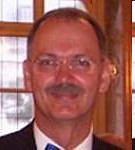 |
| Prof Chris Fowler BSc MA MS FRCP FRCS(Urol) FEBU is Dean of Education | 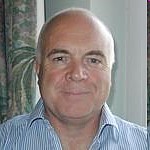 |
They say they are dubious about alternative medicine, but rather keen on integrated medicine. Seems odd, since the latter is really just a euphemism for the former.
After seeing the FiH posting, I wrote to Carroll and Fowler to get more information.
From Carroll 20 March
We are at an early stage in the planning process for the “Integrated Health & Wellbeing” strand in our new MBBS curriculum. I can send you our ideas (attached). Much will depend on whether we can make a new appointment of someone who can lead on the planning
From Fowler 25 March 2008
Our discussions with the PFIH [Prince’s Foundation for Integrated Health] have only progressed to the stage of indicating an indicative curriculum for integrated health. We don’t have the sort of detail that you are asking for at present. We are hoping that they will work with us to get someone to champion the development.
. . .
Your views would be welcome
So I sent them some views on 26 March (read them here). I also said “I find it quite astonishing that a respectable medical school should feel it appropriate to have parts of its curriculum in the hands of the Prince of Wales.”. It seems, though, that only one sort of view was wanted. On 27 March. Fowler wrote
“I find your insinuation unnecessary and insulting. We have been working on a serious response to the GMC’s requirement that we teach medical students about the range of options available to patients. It is fatuous to suggest that the Prince of Wales is personally involved in any practical sense. The Prince’s Foundation for Integrated Health is an important stakeholder and I think that it entirely reasonable both to talk to them and to seek funding to help us to develop an area that is deficient in our current provision.”
Uhuh, not a very nice response to a rather moderate letter. Lesson 1: never trust anyone who uses the word “stakeholder”.
It does seem very odd that a medical school like Barts should turn to the Prince of Wales’ Foundation for advice on medicine. After all, the bad advice given by the “Patients Guide” is rather well documented (see also here). If messrs Fowler and Carroll were really unaware of that, I’d argue that they aren’t doing their job properly.
It seems that Barts, like Edinburgh, has over-reacted to pressure from the General Medical Council (GMC). Actually all that the GMC require is that
“They must be aware that many patients are interested in and choose to use a range of alternative and complementary therapies. Graduates must be aware of the existence and range of such therapies, why some patients use them, and how these might affect other types of treatment that patients are receiving.” (from Tomorrow’s Doctors, GMC)
There is nothing there about saying that they work. Certainly medical students need to be familiar with alternative medicine, given the number of theit patients that use it. That is a job I have done myself, both at UCL and at Kings College London. I’d argue that I am marginally better qualified to assess the evidence than the Prince of Wales.
Oddly enough, the bad education in Edinburgh came also from a Professor of Medical Education and Director of Undergraduate Learning and Teaching,
The result is manifested in two ways. Barts has a “Science in Medicine” course that has resulted in medical students being placed with homeopaths. And it has a Special Studies Module in Ayurvedic Medicine. Let’s take a look at them.
An Introduction to Ayurvedic Medicine
| The aims of this Special Study Module are “To introduce the concepts and principles which underpin Ayurvedic medicine. To introduce Year 1 and 2 medical students to the Ayurvedic approach to patient assessment, diagnosis and treatment”, and to “Critically evaluate the evidence base for Ayurvedic treatments and yoga therapy”. Just one small snag there. There is next to no evidence base to be assessed. | Click to enlarge |
The module is given by Professor Shrikala Warrier, who is Dean of MAYUR: The Ayurvedic University of Europe. That sounds quite grand. But the web site of The Ayurvedic University of Europe is rather unusual for a university. It lists two courses but has no list of staff. Could it be that Professor Shrikala Warrier is the staff? Neither is it clear where Professor Warrier’s professorial title comes from. Her own private university perhaps?
The two courses it offers are B.Sc.(Hons) Ayurveda and B.Sc.(Hons) Yoga. It says that the course the “BA(Hons)Ayurvedic Studies is a three year programme of study developed in collaboration with Thames Valley University in London”. That’s odd too, because there is no mention of it on the Thames Valley University web site (and TVU is not in London, it’s in Slough). Elsewhere it is stated that the “programme has been validated by MAHE, which is also the degree awarding body”. MAHE is not explained but it appears to refer to the Manipal Academy of Higher Education, in Goa, India. That looks like a pretty good place. It does not offer degrees in Ayurveda, though there is a small Department of Ayurvedic medicine within the otherwise entirely conventional Kasturba Medical College-Manipal. Their first year physiology exam would tax our students.
Elsewhere we see the same address, 81 Wimpole Street, listed as The Manipal Ayurvedic University of Europe (a joint venture between The Manipal University and the Ayurvedic Company of Great Britain) Prof. S. Warrier, B.A.(Hons), M.A., Ph.D., MILT, Dean of Academic Planning.
If one checks Mayur Ltd at Companies House, one finds that it has two directors, Lady Sarah Morritt and Professor Shrikala Warrier. The company report shows that no accounts have been filed up to now and their 2008 accounts are overdue.
The business history of ayurveda is nothing if not tortuous. The London Gazette (May 2008) notifies us that
AYURVEDA HOLDINGS LIMITED (chairman Lady Sarah Morritt) was passed a Special Resolution: “That the company be wound up voluntarily.”
If you email the Ayurvedic University of Europe, the reply comes not from a University address but from unififiedherbal.com. That seems to be some sort of marketing company, at the same address, 81 Wimpole Street. But efforts to find out more about it from Companies House show that UnifiedHerbal.com was dissolved on 3 October 2006.
Several of the links are broken on the web site of Ayurvedic University of Europe, but one that does work is ‘products’. That takes you to the sales pages of http://www.drwarrier.co.uk/. That doesn’t look much like a university, but no prizes for guessing the address. Yes, it’s 81 Wimpole Street again. They will sell you all sorts of cosmetics, though Companies House lists Dr Warrier Limited, and tells us
Last Accounts Made Up To : 31/08/2007 (DORMANT) and
Next Return Due : 26/09/2008 OVERDUE. Their registered office is
at Harold House, Waltham Cross EN8 7AF.
From drwarrier.co.uk you can buy, for example,
The most commonly prescribed Ayurvedic formula. Triphala is an effective blood purifier that detoxifies the liver, helps digestion and assimilation, and reduces serum cholesterol and lipid levels.
Blood purifier? Detox? Where have we seen this sort of utter gobbledygook before? Or perhaps she can sell you some
Traditionally used for obesity and overweight, and reducing and preventing accumulation of cholesterol (LDL). Its anti-inflammatory and detoxifying actions help reduce arthritic pain and swelling.
There isn’t the slightest evidence for these effects in man. Hence, no doubt, the usual weasel words. “traditionally used for . . . ”
The sales department alone casts rather a large doubt on Prof Warrier’s ability to teach medical students how to “critically evaluate the evidence base for Ayurvedic treatments”.
It does seem a bit surprising that a top flight medical school should think that this is an appropriate place to educate its students.
Medicine in Society
The syllabus at Barts includes something called Medicine and Society. Page 5 of the second year Tutor Guide mentions “complementary therapies” as part of the course. There is little hint about what that means in practice.
It turns out that the alt med placements are at the Greenwich Natural Health Centre. Nothing is too barmy for them Acupuncture. Cranial Osteopathy, Craniosacral Therapy, Herbal Therapy, Homeopathy, Hot Stone Therapy and Nutritional therapy to name but a few of the preposterous make-believe stuff that is on offer.
Medical students are having to spend their time listing to stuff like this, on ‘hot stone therapy’.
“Hot stone therapy / massage is a kind of massage that uses treated volcanic rocks such as basalt and basinite that are believed to promote relaxation as well as eliminating negative energy within the client’s body, mind and soul.”
“These stones are carefully gathered and handcrafted for various sizes, shapes and weights according to what part of the body it will be use on.”
Or this, on ‘nutritional therapy’.
“Many of us lack the basic raw materials (from food and drink) to function at our best. Intensive farming, pollution, stress, stimulants and an over-reliance on processed foods are just some of the reasons for us being deficient in vital nutrients. As a result, we may develop serious degenerative diseases like cancer or arthritis.”
“Some clients may experience reactions like headaches, skin eruptions or bad breath during the first stage of treatment. These are quite normal and are due to detoxification, which is usually followed by a sense of well-being and increased energy.”
That must be about as close as you can get to claiming you can prevent cancer by taking vitamin pills. It is wrong and it is dangerous,
Sigh. What century are we living in?
According to Barts’ second year Tutor Guide, “Placement tutors are responsible for student assessment”.
What sort of grade will the student get if they tell their tutor in homeopathy or ‘Nutritional therapy’ that they are talking nonsense?
What do the students think?
Could the Ayurvedic course be the very same course that is referred to by a second year medical student on the Unprotected Text blog?
“When I found out my friend had been attached to a “doctor” in Ayurvedic “medicine” for the year I was horrified, as was she, and the school would not allow her to change claiming that the point is not to learn the medicine but its role in the multidisciplinary healthcare team.
I don’t believe that there is such a role.
The very fact that a student is forced to put up with this as a part of their education is appalling.”
A comment left on Unprotected Text by someone writing as ‘Barts Medic’ said
“I was HORRIFIED to hear that some of my friends have their medsoc placements
at such RUBBISH places too!last week, they were forced into a room one by room to be touched up (‘massaged’)
by the ‘doctor-person’ to HEAL them. she rubbed them all over, and CHANTED! WTF.if i was given a CRAPPY placement like that, i wouldnt turn up either”.
And there is an excellent statement about “holistic medicine” on Unprotected Text. Better, perhaps, than you’d get from the GMC.
“Holistic medicine is in fact a world away from homeopathy, although the two are often confused predominantly by homeopaths trying to validate their branch of “medicine”. Much of what is taught in medical school is in fact, holistic, and so it should be. The importance of mentality, or spirituality in medicine should not be used to excuse homeopathy.”
“That doesn’t seem to add up” is another blog that relates the experiences of another student who has been exposed to “Enforced quackery Day 1, “, “Enforced quackery Day 2“, “Enforced quackery Days 3 and 4“. He says
“. . .by the end of day 3 the students *still* hadn’t seen any patients and that, when confronted with this fact the person in charge is reported to have said that this was because she was scared of what the students might say to the patients… Apart from this being a massive insult to the professionalism of the students, it is at least an encouraging sign that they have not been very effectively indoctrinated.”
It seems that we shall soon have some more documentary evidence. It is truly impressive to find that Barts’ medical students are so bright and that they have the courage to speak up about it.
So there is one good thing. We have some very perspicacious medical students in London.
Pity that one can’t say the same thing of their teachers.
Follow-up
I have it on good authority that the unhappy students who were placed at the Greenwich Natural Health Centre were presented with one of the more absurd documents ever to be produced by homeopaths, “An Overview of positive homeopathy research and surveys“.
There is no need to argue about whether homeopaths cherry-pick the evidence. The selective use of evidence is announced proudly, right there in the title.
What excuse can Bart’s have for exposing medical students to such profoundly anti-educational stuff as this?
Later there appeared on the That doesn’t seem to add up blog, Enforced
Quackery – the literature. The unfortunate students who were pushed into a homeopathic placement were give a print out of a page from Sue Young’s homeopathic web site. It is merely a bit of phony history that attempts to link Pasteur with homeopathy.
Sue Young, incidentally, is a homeopath who has consistently breached the Code of Ethicsof the Society of Homeopaths by claiming to treat serious diseases, though needless to say the Society did nothing about it. She is also the person who wrote a wholly inaccurate account of the reasons why my blog left the UCL server (see alse here and here). She didn’t, needless to say, ask me, but luckily she was soon corrected on quackometer and in the Guardian.
Incidentally, the Unprotected Text blog continues to provide a fascinating student view on medical education. Students show more sense than their teachers not only about alternative nonsense but also about other gimmicks like ‘problem based learning’.
A really good bit of investigative journalism by BBC Inside Out South West.was shown on Wednesday 12th November 2008. Unfortunately it was shown only in the South West. If you are in the UK you can see it on BBC iPlayer. There is a clip on Youtube. It features some very sensible comments from a real dietitian, Catherine Collins, and from Ben Goldacre .
The College of Natural Nutrition is not a university. In fact it is an industrial building in Tiverton, Devon.
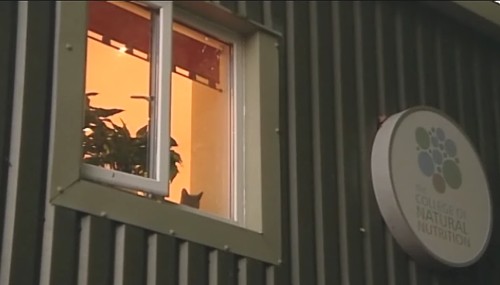
(Could that be a tutor in the window?)
But some of the courses are given in the far grander surroundings of Regent’s College in London.
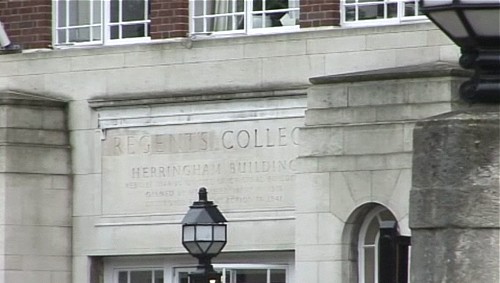
The College of Natural Nutrition diploma (over £1300) is the only qualification of Barbara Nash. Nash is the ‘nutritionist’ who treated Dawn Page with a ‘hydration diet’, that resulted in organ failure, epilepsy and brain damage. Nash’s insurers paid £800 000. in damages, but didn’t admit liability.
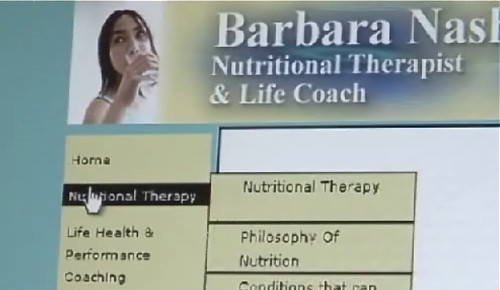
Dr Ben Goldacre pointed out that it perhaps isn’t surprising that people like Nash so often act far beyond their competence because they are being “aggrandised by the strange made-up colleges and bodies that are training and accrediting them”.
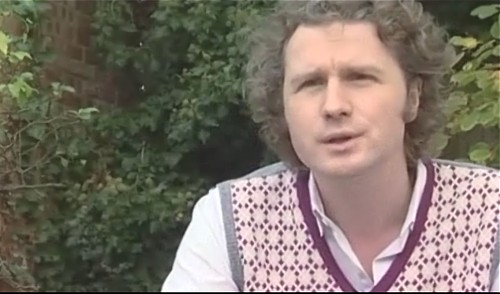
When you see some of the things she was taught, it isn’t surprising. Secret video recording revealed some totally bizarre teaching by the College principle, Barbara Wren.
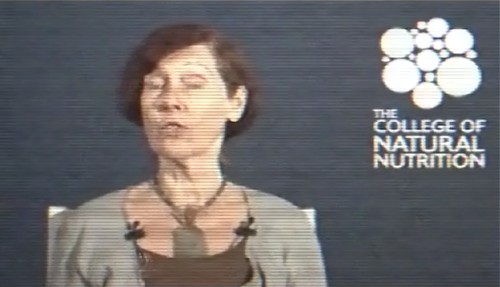
She claimed to have cured thyroid cancer by applying external compresses, half an hour with castor oil and half an hour with your own urine. Claiming to be able to cure cancer is illegal. Of course that isn’t done in public, just in private (a bit like Boots’ advice on useless supplements)). The BBC did some secret filming.
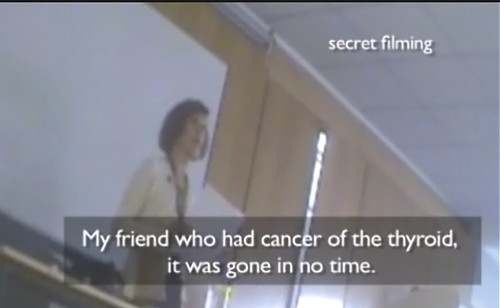
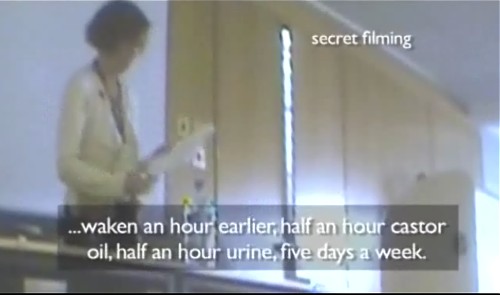
And what caused the cancer? A computer stored under the bed.

Catherine Collins commented “It would be laughable if it wasn’t so serious.
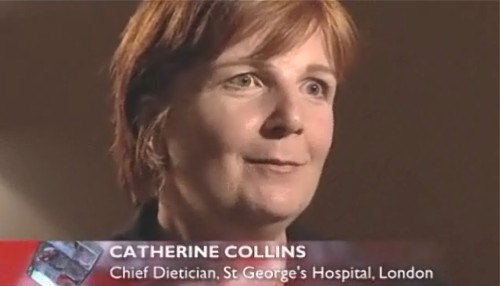
In another lecture, Barbara Wren sounds very peevish because she is going to be prevented from “prescribing” 25 times the safe dose of iodine. She advises her hapless customers to go to a pet shop and buy Lugol’s (iodine) solution, used to treat fish tank water, so they can poison themselves in peace.
The College of Natural Nutrition, and Barbara Nash, are both still in business The web site of the former has the disclaimer
“People who take the information and make decisions regarding their health or medical care, which they believe are based on ideas contained in this website, do so at their own risk. The author and publisher are not responsible for any adverse effects or consequences resulting from the use of any of the suggestions or information contained in the website “
I doubt if that is enough to exempt you from the Cancer Act. Anybody who does make medical decisions based on this utterly batty advice might be thought to deserve what they get.
Alternatively, if you are daft enough, buy the course..

Postscript. Some other blogs that give good information about this topic include Thinking is Dangerous and NHS Blog doctor
Thames Valley University is one of those shameful institutions that offer Bachelor of Science degrees in homeopathy. They don’t stop there though. They’ll teach you several other forms of make-believe medicine. Among these is “nutritional medicine”. This is taught at the Plaskett Nutritional Medicine College which is now part of Thames Valley University.
 |
 |
Everyone is for good nutrition of course, but ‘nutritional medicine’, or ‘nutritional therapy’ pretends to be able to cure all sorts of diseases by changes in diet or by buying expensive nutritional supplement pills. It has no perceptible relationship to the very important subjects of ‘nutrition’ or ‘dietetics’. Nutritional therapy is very firmly part of alternative medicine, in other words it is largely quackery. If you don’t believe that, read on.
The subject of nutritional therapy was in the news recently because of Matthias Rath. He is the person who is reponsible for the death of many Africans because of his advocacy of vitamin pills for the treatment of HIV/AIDS. He didn’t just (mis)treat people, but also played a role in persuading the recently departed Thabo Mbeki, and his health minister (“Mrs Beetroot”) to abandon effective therapies for AIDS sufferers. See reports in The Guardian, by Ben Goldacre, and here,
I’ve written a lot about the penetration of quackery into universities, and I thought I’d seen the worst with ‘amethysts emit high yin energy‘. But, as Goldacre said, let me tell you how bad things have become. .
Recently I came into possession of a lengthy set of notes for a first year course on “The Holistic Model of Healthcare”. The notes are from the 2005 course at Thames Valley University, They are not signed, but appear to have been written by Dr Lawrence Plaskett himself. . You can download the whole set of notes here.

Here are a few choice quotations. The basis of them is pure vitalism. They read like a throwback to the dark ages. Little comment is needed. They speak for themselves.
1.3 What do Orthodox Dieticians know about Food and Health?
Dieticians working in the National Health Service and private clinics and hospitals are usually well trained in the basics of the subject, though they too have an entirely orthodox slant. By and large they seem to accept the general view of most of the medical profession that nutrition does not affect illness much. Hence, they restrict themselves to designing diets required by the doctors for whom they work – usually for specified narrow purposes, such as low fat diets, low sodium diets etc. Such diets are, indeed, important in the hospital management of certain diseases (once these have become established) but they represent extremely limited horizons. Much that is in the basic and essential training of alternative nutritional practitioners is missing from the training of dieticians. As a result, most hospital diets are not very good for health judging from the parameters that will be set down in the following Sessions
Well, it is true that real dietitians prefer not to base their practice on mediaeval vitalism. That is what marks them out as professionals.
1.4 Relationship to Science and the Limitations of Orthodox Methods
However, the subject of Wholistic Nutrition transcends the area of human understanding for which science, alone, is appropriate. The reason is that it is ‘vitalistic’. It recognises the presence in all life forms including the human body, of subtle (or ‘etheric’) energy forces not easily measurable by the physicist’s equipment. It shares that position with the ‘energy medicine’ disciplines such as homoeopathy, traditional acupuncture and spiritual healing. It follows an approach to those subtle energies that is embodied in the discipline and philosophy of naturopathy.
Vitalism is the notion that life in living organisms is sustained by a vital principle that cannot be explained in terms of physics and chemistry. This vital principle, often called “the life force”, is something quite distinct from the physical body and is responsible for much that happens in health and disease.
Naturopathy is a relatively modem term for an ancient concept (dating back to 400 BC). This concept embraces the notion that the body is inherently self-healing and that it is the practitioner’s job to stimulate and support this process. Each patient is recognised as having a unique life experience and a unique genetic inheritance. All diseases are seen as one and as attempts by the body to purify itself of toxins. Treatment focuses on causes rather than on symptoms and always addresses the whole person. The wise words of Hippocrates (often called the Father of Medicine) express some of the main tenants of naturopathic thought. He said:
- It is only nature that heals and wherever and whenever possible nature should be given the opportunity to do so.
- Disease is only an expression of purification.
- All disease is one.
- Let food be your medicine and medicine be your food.”
Hence, most ‘alternative’ nutritionists see conventional nutrition. as being rather rigid and unmoving. Hence, they also see it as very limited. This happens because orthodox nutritionists tend to be locked into science alone. They fail to grasp the significance (or the reality of) the subtle energies and they reject the philosophy of vitalism. It is generally the view of ‘alternative’ nutritionists that understanding these things is a major step to healing the patient.
“Understanding” vitalism sounds more like a way of harming patients than healing patients.
1.5 The Pressure of the Orthodox model
Almost everyone who takes steps towards ‘alternative’ medicine experiences a backlash from others around them who have not been able to make the same conceptual change. Patients wanting to settle into an ‘alternative’ approach can be subject to negativity from their doctors (and as a result many patients do not ask the doctor’s opinion). But students and practitioners alike are frequently subject to negative expressions and even frank hostility from relatives
who can understand only orthodox, symptomatic treatment. It is therefore best to be forewarned that your adherence to ‘alternative’ principles will be tested in these ways.
The “Life Force” gets capital letters, like God, But what is it? Pure fantasy.
2 THE LIFE FORCE
2.1 What does our Energy Consist of?
At the root of most hoIistic therapies lies the belief that all life is animated by a subtle force. We call this the Life Force. You either believe it or you do not. It cannot exactly be proved at the moment and the belief is not in accord with the yardsticks that we call ‘scientific’, The belief is a little akin to the belief in God or in spirits or ghosts, and yet at the same time it is not,
because the Life Force is by no means so remote from us. It is not necessarily difficult for an agnostic to accept the Life Force. The writer was once asked for a definition of the Life Force and wrote:” The Life Force is that non-material. non-physical force that animates all life forms and distinguishes them from non-living matter. It Is seen as a determining Force, not as a mere accompaniment to the phenomenon of Life. That is, it determines whether Life can exist or not. It determines the physical form that a life form takes: by its quality and its strength it determines the health, vigour and vitality of the life form. Hence it determines our freedom from, or our susceptibility to illnesses, and our general ability to come through and to recover from Life’s stresses and traumas.”
A bit later it gets even better, when we get to astral travel and even survival after death. Truly bonkers.
The postulate of a subtle Life Force makes a natural connection with such topics as out of body experiences, astral travel and even survival after death. This happens because the subtle Life Force appears by its very nature to be “life within a different medium” and if life can exist in
a different medium, then why should it not exist quite independently of the physical body?
So what’s the evidence?
2.2 Evidence Concerning the Life Force
Since our ‘usual’ human senses only work through the medium of the human body we can only expect to detect the Life Force or other subtle forces, through their interactions with matter. It is clear that these interactions are themselves subtle and sensitive because one level or state is impinging upon another. It is postulated that they are not entirely of our world, not physical, only detectable with physical apparatus under special conditions.
Often they are described as “that which science cannot see”. Not surprisingly, therefore, when investigators come forward convinced that they have a phenomenon that demonstrates the Life Force. the physicists, looking at it with a steely scientific eye, are not usually ready to accept the conclusions claimed. Hence, we have several delicate phenomena that are often claimed to be manifestations of the Life Force, yet not accepted as such scientifically.• The experiments done by Harold Saxton Burr on the “Fields of Life”.
• The experimen1s performed on detecting and measuring “Electrodynamic fields”
• The phenomenon of “Capillary dynamolysis”
• Homoeopathic effects.
• The Chinese ‘energy pulses’ at the human wrists.
From experience it is clear that many students will simply accept the Life Force as ‘obvious’. Some will say they have always known about it. Others are able to accept the concept now as a reasonable principle. Others perhaps (though we have rarely come across it) will never accept the Life Force. If that occurs, it seems a shame, for it removes some of the excitement from wholistic nutrition, . . .
What’s said about the homeopathic evidence?
2.6 Homoeopathic Effects
It is not until Nutritional Medicine students have qualified and got into practice that they usually employ any homoeopathy as an adjunct to their therapy in anything other than a first-aid role. That is because homoeopathy is a complex training in its own right and a quite separate discipline. However, any demonstration of the effectiveness of homoeopathic medicines at potencies higher than 12C is evidence for the existence of the subtle etheric energies. Such remedies have been diluted beyond the point at which the last traces of material substance derived from the Mother tincture, have been removed, leaving only the residual energy associated with the original material.
Of course the notes go on to misrepresent the clinical trials which actually show that homeopathy is mere placebo.
2.9 Toxic Effects upon the Life Force
The Life Force is generally seen as an abundant ebullient and beautiful manifestation of Nature’s energy. Although some forms of acupuncture take in the concept of a form of polluted Life Force called Aggressive Energy”, that idea is not shared much by other whoIistic disciplines. We are left for the most part with the idea of a rather perfect form of energy.
In Western Naturopathic thought, the enemy of the Life Force is toxicity. The Life Force inhabits a potentially perfect physical body. The main threat to the integrity of that body consists of the body’s own metabolic wastes, if they are not properly cleared out. Plus environmental toxins that gain access to the body from outside, or that are generated in the bowel. In that way the bowel gains a high level of importance in Naturopathy and ‘”Nature Cure”.
The Life Force, then, with its almost holy purity, is in danger of being inhibited, dampened down and threatened by what amounts to some entirely physical dirt that gains access to that temple of the soul the human body. Whilst in Traditional Chinese Medicine impurities in the mind, emotions or spirit are just as important as physical impurity, it is naturopathy that focuses upon the actual physical sewers of the body.
Aha, that’s it. Holy water.
The inability of naturopaths in the past to identify specific toxins or to point with sufficient exactitude to the ways in which they can be removed, has been the Achilles Heel of the naturopaths in trying to represent their views in the past to orthodox doctors or medical scientists.
And it still is. The alleged toxins have never been identified, still less removed. Detoxification is a myth of downmarket women’s magazines and profiteering spas. And, of course, of some Bachelor of Science degrees.
2.10 Nutritional Effects upon the Life Force
2.10.1 Bulk nutrients
Next comes the consideration of the bulk nutrients – the protein, carbohydrate and fat. These are our source of biochemical energy and we obviously starve without them. Their purity is crucial. If they have been chemically modified or damaged by toxic interactions, then they will entrain toxicity and also be hard to break down. Even at best, their digestion and assimilation costs energy, which may well be both biochemical and subtle.
What “toxic interactions”? This is all sheer fantasy.
2.10.3 The micronutrients
When you practice [sic] nutritional therapy in a naturopathic setting, being aware at the same time of the on-going biochemistry, you become critically aware of the role of the micronutrients in a way that the classical naturopaths were not.
Biochemical reactions will flow better when they are present in the correct balance. Therefore the minerals have a key interaction with the Life Force. Without the right minerals the Life Force can be conceived of as pushing forward to achieve high activity in the body, yet being blocked through the chemical composition not being correct. If you apply the minerals in this situation, there may, indeed. be a surge forward of the energy.
Whatever that may mean.
3 THE EBULLIENCE OF THE LIFE FORCE: STOPPING THE ROT AND STARTING TO RECOVER
3.1 The Horror of Deterioration: The Chronic State
All that has gone before has already shown that the grassroots of deterioration in the physical body are:
- Weakened Life Force
- Nutritional Deficiency and Imbalance
- Toxic Attack
If nutritional error or deprivation are the more strongly implicated primary cause, then the Life Force struggles with an unbalanced physical body, getting the tissue biochemistry to work at full integrity is impossible; hence. the body’s detoxification system becomes incompetent and the body’s toxic burden may rise steeply. At the same time the Life Force ails.
So, focusing as we do now upon elimination of toxins (the very nub of classical naturopathy), we perceive that it is a process that depends upon a good strong Life Force and also upon adequate nutrient intake. Therapies that directly stimulate the Life Force (homoeopathy, acupuncture and spiritual healing) therefore make an indirect, though real, contribution to toxic elimination through increasing the Life Force or otherwise improving its health and balance.
So according to this, all CAM is much the same. That idea will provoke bitter internecine warfare.
3.5 The Law of Cure
We have above depicted the move from relative health to chronic illness as a downward path. Equally, the route back from the edge of the abyss of chronic illness is one of revitalisation and detoxification. The idea of the ‘route back’ was spotted years ago by the homoeopath, Constantine Hering, and has become known as ‘Hering’s Law of Cure’.
The Law further embodies the notion that toxins, and therefore symptoms, tend to move outward from within as recovery or cleansing occurs. This is fully in accord with the classical naturopath’s idea. Toxins close to the surface of the body are conceived to be most likely on their way out. The skin is an eliminatory organ and toxins at or near the skin level are not so much of a threat to well being. Naturally, the patient may well be horrified at the disfiguring
rash that may be seen by all. Nonetheless, the patient is seen to be far better off than when having these toxins deep within the body, held, perhaps within essential organs that are becoming progressively damaged.
This sounds increasingly like a ‘do-nothing’ approach (much like homeopathy then).
3.6 Suppression
Boils used to swell up into a red sore and then burst. Very bad ones, or carbuncles, might be lanced to cause the pus (morbid matter) to run out. These days, boils and carbuncles tend to occur much less than formerly, presumably because of the lower Life Force of the population and the generally suppressive medical culture. The chances are that they get treated with an antibiotic long before they get a chance to come to a head and burst. Such treatment is suppressive in the strictly naturopathic sense of the word. The same is absolutely true with regard to bringing down artificially the temperature during a fever, whereas ‘sweating it out’ is the natural thing to do.
More of the do-nothing approach.
4.2 How lridology Helps us to See Toxic Foci
As mentioned above, toxic foci (deposits) in the body show up in the iris of the eye. The iris is arranged so as to encompass a complete ‘map’ of the body. with all the organs and systems laid out upon it. Hence the location of a toxic deposit in the iris shows the iridologist its position within the body. The toxins may appear as colours, spots. blobs and smears in particular
places in the iris, or as darkened areas.
Now iridology, another sort of fantasy medicine, creeps in.
5.5 What Place for Immunisations?
Here we shall restrict ourselves to saying as little as possible. We shall. indeed, make no recommendations. However. the classical naturopaths and homoeopaths have all been of one voice in condemning the use of morbid diseased matter for injection into the human body to prevent disease. It was not, they said, a proper procedure. There has also been much disagreement about how effective such measures are. Of course, whenever there is danger of infection. it is wrong to do nothing. At least you should use the homoeopathic equivalent treatment. As to the effectiveness of those methods, that is beyond the scope of this course.
As to the personal view of the writer, it is that the natural therapists who have declared thernselves on this topic in the past are probably right. They have maintained that immunisation is just another form of toxin and an especially potent one capable, on its own, of sparking a downward spiral into ill health in susceptible people. As to what extent that effect might be balanced by benefit, that is an unresolved argument. The writer does not use immunisations himself.
Well there is a surprise. Just like almost every other quack, the writer would endanger the whole population by opposing immunisation.
The quiz
The notes contain a number of questions, and, more interestingly, model answers are given at the end. Here is one example.
Question. Why do some patients respond well to very little treatment?
Answer. The size of the toxic burden, the strength of the Life Force and micro nutrient status strongly influence a person’s response to treatment. Therefore a person with a low toxic burden, high micro nutrient status and strong life force should respond well to very little treatment.
Or, to put it differently, echinacea cures your cold in seven days, when otherwise it would have taken a week.
Conclusion
We’ll always have crackpot ideas about medicine, at least until real medicine gets much more effective than it is now. For example, in low back pain, the cause is usually not known, the treatments are only palliative, and it isn’t very effective palliation either. The big difference between real medicine and crackpot medicine, is that in real medicine you aren’t allowed to invent the answer when you don’t know it.
No doubt the author of these fantasy notes was entirely sincere in his delusions. But how can any self-respecting vice-chancellor tolerate having this sort of stuff as part of a Bachelor of Science degree? Professor Peter John, vice-chancellor of Thames Valley University is not a scientist. His background is in education. But you don’t need to be a scientist to see what nonsense is being taught as science in his university.
Perhaps he didn’t know what is going on. Well, he does now.
Follow-up
Thanks to Ben Goldacre for the link from his miniblog.?
Thames Valley University and their degree in “Nutritional Medicine”
Why? Why do they pretend it’s science? Why don’t they just call it “some stuff we made up”

